Очень важно уметь вовремя найти нужную информацию в системе. Конечно, все современные файловые менеджеры предлагают отличные функции поиска, но им не сравнится с поиском в терминале Linux. Он намного эффективнее и гибче обычного поиска, вы можете искать файлы не только по имени, но и по дате добавления, содержимому, а также использовать для поиска регулярные выражения.
Кроме того, с найденными файлами можно сразу же выполнять необходимые действия. В этой статье мы поговорим о поиске с помощью очень мощной команды find Linux, подробно разберем её синтаксис, опции и рассмотрим несколько примеров.
Команда find – это одна из наиболее важных и часто используемых утилит системы Linux. Это команда для поиска файлов и каталогов на основе специальных условий. Ее можно использовать в различных обстоятельствах, например, для поиска файлов по разрешениям, владельцам, группам, типу, размеру и другим подобным критериям.
Утилита find предустановлена по умолчанию во всех Linux дистрибутивах, поэтому вам не нужно будет устанавливать никаких дополнительных пакетов. Это очень важная находка для тех, кто хочет использовать командную строку наиболее эффективно.
Команда find имеет такой синтаксис:
find [папка] [параметры] критерий шаблон [действие]
Папка – каталог в котором будем искать
Параметры – дополнительные параметры, например, глубина поиска, и т д
Критерий – по какому критерию будем искать: имя, дата создания, права, владелец и т д.
Шаблон – непосредственно значение по которому будем отбирать файлы.
Основные параметры команды find
Я не буду перечислять здесь все параметры, рассмотрим только самые полезные.
- -P – никогда не открывать символические ссылки.
- -L – получает информацию о файлах по символическим ссылкам. Важно для дальнейшей обработки, чтобы обрабатывалась не ссылка, а сам файл.
- -maxdepth – максимальная глубина поиска по подкаталогам, для поиска только в текущем каталоге установите 1.
- -depth – искать сначала в текущем каталоге, а потом в подкаталогах.
- -mount искать файлы только в этой файловой системе.
- -version – показать версию утилиты find.
- -print – выводить полные имена файлов.
- -type f – искать только файлы.
- -type d – поиск папки в Linux.
Критерии
Критериев у команды find в Linux очень много, и мы опять же рассмотрим только основные.
- -name – поиск файлов по имени.
- -perm – поиск файлов в Linux по режиму доступа.
- -user – поиск файлов по владельцу.
- -group – поиск по группе.
- -mtime – поиск по времени модификации файла.
- -atime – поиск файлов по дате последнего чтения.
- -nogroup – поиск файлов, не принадлежащих ни одной группе.
- -nouser – поиск файлов без владельцев.
- -newer – найти файлы новее чем указанный.
- -size – поиск файлов в Linux по их размеру.
Примеры использования
А теперь давайте рассмотрим примеры find, чтобы вы лучше поняли, как использовать эту утилиту.
1. Поиск всех файлов
Показать все файлы в текущей директории:
find
find .
find . -print
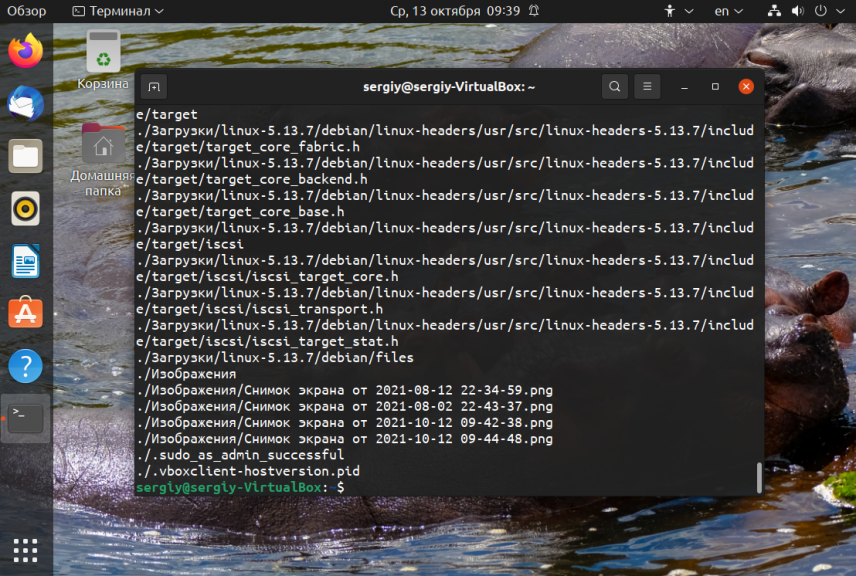
Все три команды покажут одинаковый результат. Точка здесь означает текущую папку. В место неё можно указать любую другую.
2. Поиск файлов в определенной папке
Показать все файлы в указанной директории:
find ./Изображения
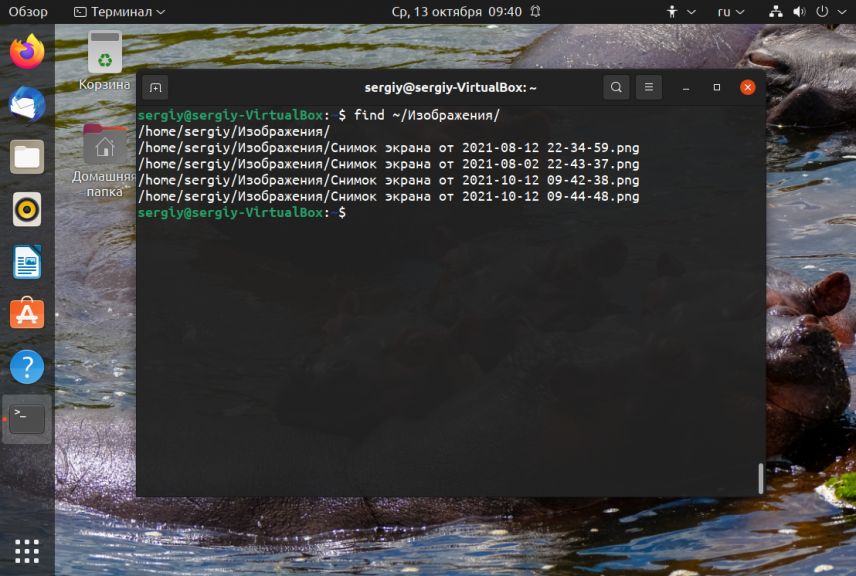
Искать файлы по имени в текущей папке:
find . -name "*.png
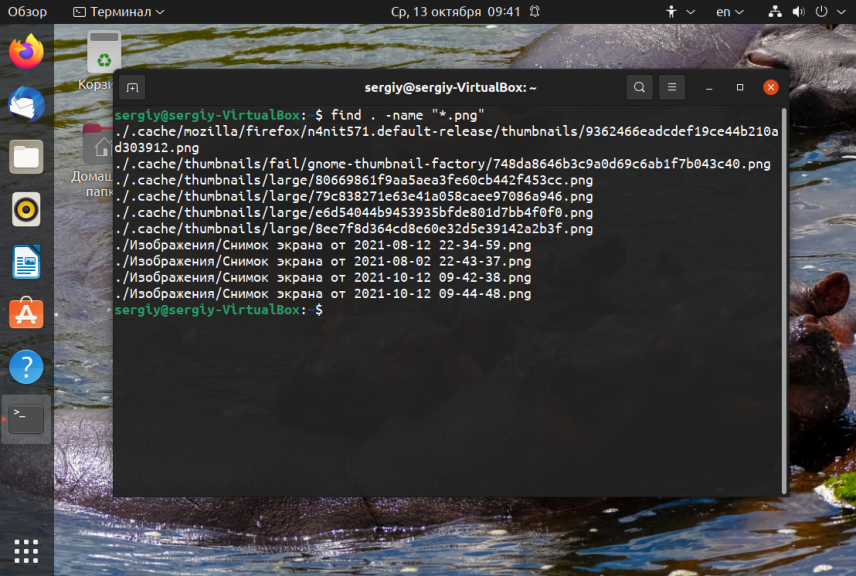
Поиск по имени в текущей папке:
find . -name "testfile*"
Не учитывать регистр при поиске по имени:
find . -iname "TeStFile*"
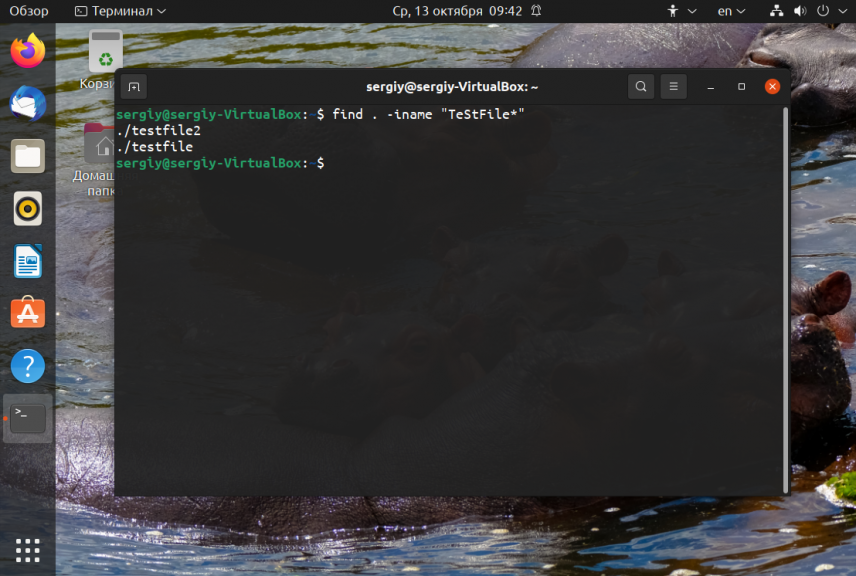
3. Ограничение глубины поиска
Поиска файлов по имени в Linux только в этой папке:
find . -maxdepth 1 -name "*.php"
4. Инвертирование шаблона
Найти файлы, которые не соответствуют шаблону:
find . -not -name "test*"
5. Несколько критериев
Поиск командой find в Linux по нескольким критериям, с оператором исключения:
find . -name "test" -not -name "*.php"
Найдет все файлы, начинающиеся на test, но без расширения php. А теперь рассмотрим оператор ИЛИ:
find -name "*.html" -o -name "*.php"
Эта команда найдёт как php, так и html файлы.
6. Тип файла
По умолчанию find ищет как каталоги, так и файлы. Если вам необходимо найти только каталоги используйте критерий type с параметром d. Например:
find . -type d -name "Загрузки"
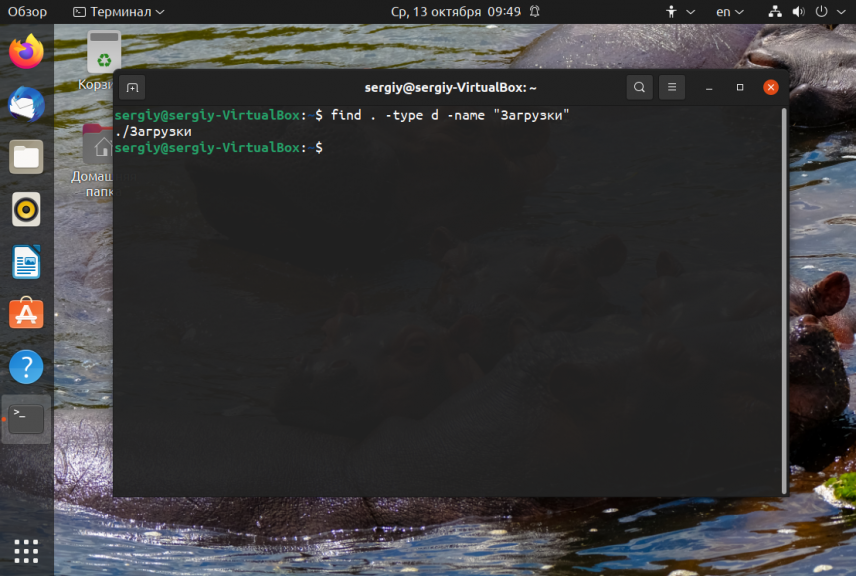
Для поиска только файлов необходимо использовать параметр f:
find . -type f -name "Загрузки"
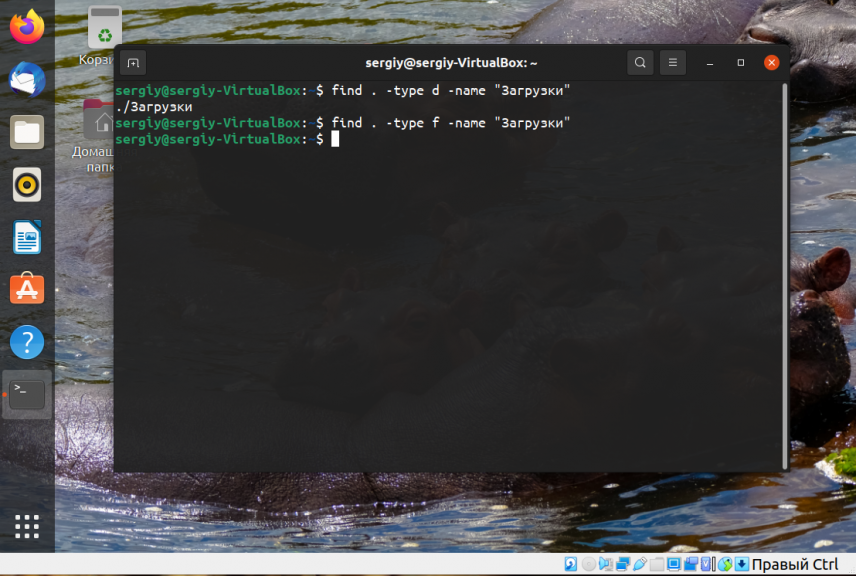
6. Несколько каталогов
Искать в двух каталогах одновременно:
find ./test ./test2 -type f -name "*.c"
7. Поиск скрытых файлов
Найти скрытые файлы только в текущей папке. Имена скрытых файлов в Linux начинаются с точки:
find . -maxdepth 1 -type f -name ".*"
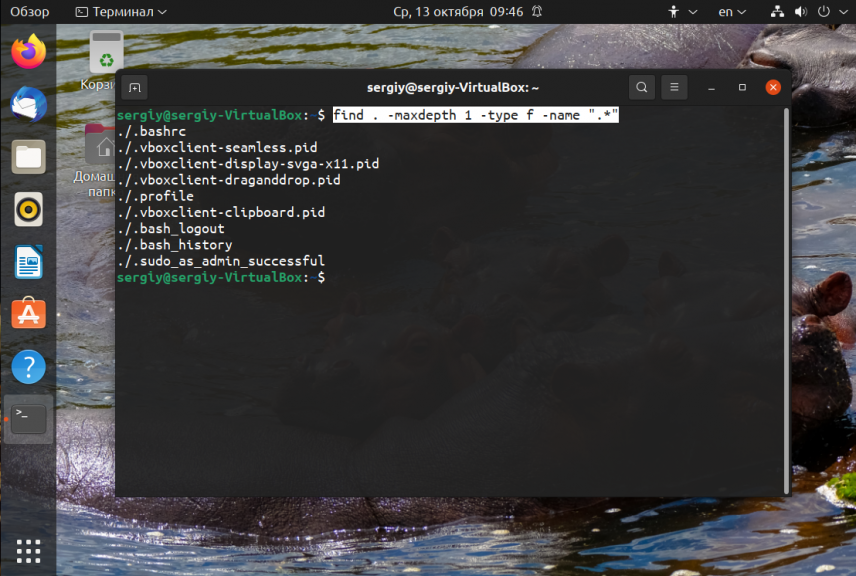
8. Поиск по разрешениям
Найти файлы с определенной маской прав, например, 0664:
find . -type f -perm 0664
Права также можно задавать буквами для u (user) g (group) и o (other). Например, для того чтобы найти все файлы с установленным флагом Suid в каталоге /usr выполните:
sudo find /usr -type f -perm /u=s
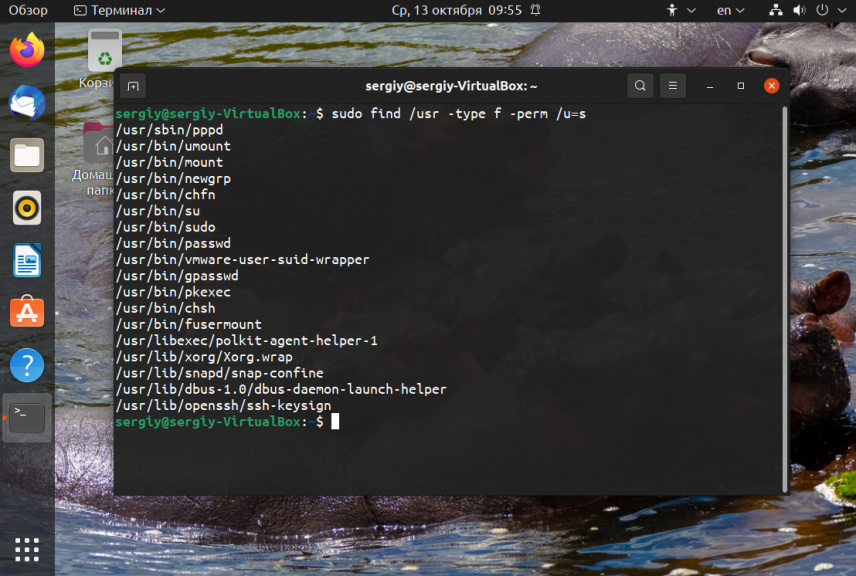
Поиск файлов доступных владельцу только для чтения только в каталоге /etc:
find /etc -maxdepth 1 -perm /u=r
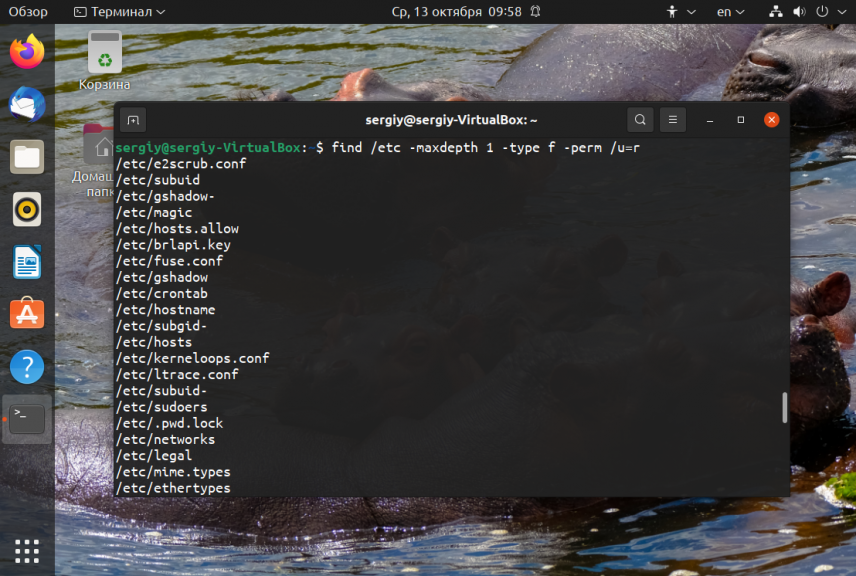
Найти только исполняемые файлы:
find /bin -maxdepth 2 -perm /a=x
9. Поиск файлов в группах и пользователях
Найти все файлы, принадлежащие пользователю:
find . -user sergiy
Поиск файлов в Linux принадлежащих группе:
find /var/www -group www-data
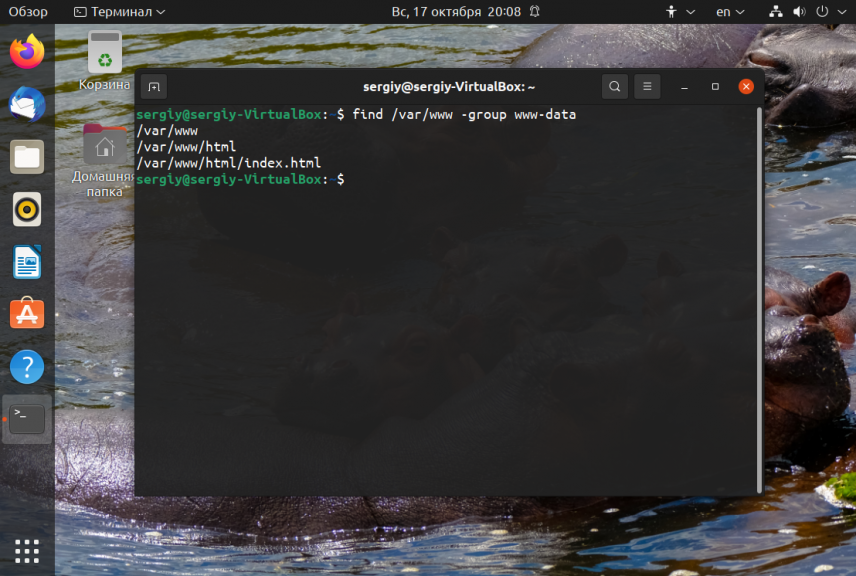
10. Поиск по дате модификации
Поиск файлов по дате в Linux осуществляется с помощью параметра mtime. Найти все файлы модифицированные 50 дней назад:
find / -mtime 50
Поиск файлов в Linux открытых N дней назад:
find / -atime 50
Найти все файлы, модифицированные между 50 и 100 дней назад:
find / -mtime +50 -mtime -100
Найти файлы измененные в течении часа:
find . -cmin 60
11. Поиск файлов по размеру
Найти все файлы размером 50 мегабайт:
find / -size 50M
От пятидесяти до ста мегабайт:
find / -size +50M -size -100M
Найти самые маленькие файлы:
find . -type f -exec ls -s {} ; | sort -n -r | head -5
Самые большие:
find . -type f -exec ls -s {} ; | sort -n | head -5
12. Поиск пустых файлов и папок
find /tmp -type f -empty
find ~/ -type d -empty
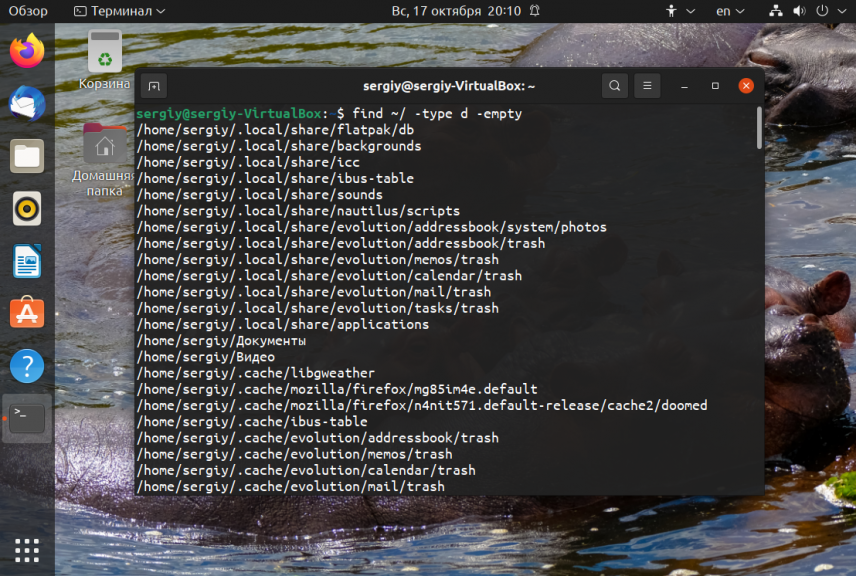
13. Действия с найденными файлами
Для выполнения произвольных команд для найденных файлов используется опция -exec. Например, для того чтобы найти все пустые папки и файлы, а затем выполнить ls для получения подробной информации о каждом файле используйте:
find . -empty -exec ls -ld {} ;
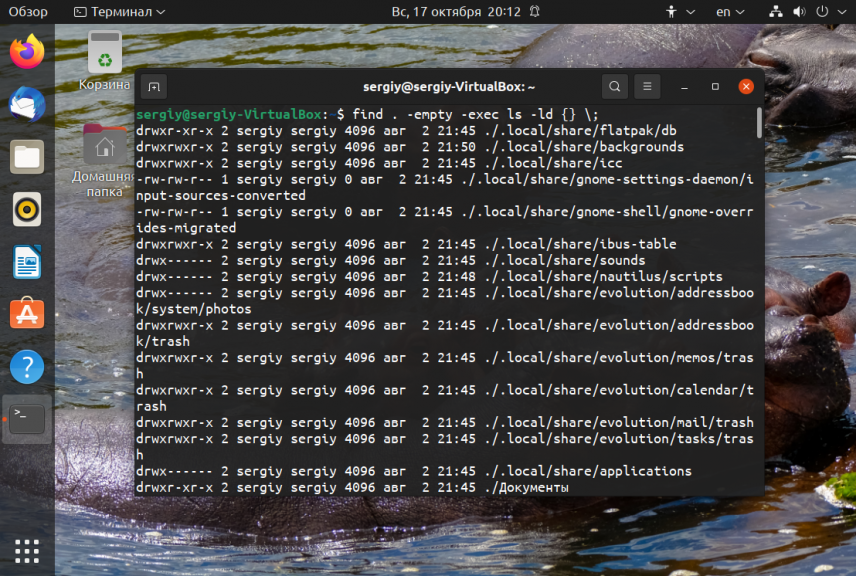
Удалить все текстовые файлы в tmp
find /tmp -type f -name "*.txt" -exec rm -f {} ;
Удалить все файлы больше 100 мегабайт:
find /home/bob/dir -type f -name *.log -size +100M -exec rm -f {} ;
Выводы
Вот и подошла к концу эта небольшая статья, в которой была рассмотрена команда find. Как видите, это одна из наиболее важных команд терминала Linux, позволяющая очень легко получить список нужных файлов. Ее желательно знать всем системным администраторам. Если вам нужно искать именно по содержимому файлов, то лучше использовать команду grep.
Обнаружили ошибку в тексте? Сообщите мне об этом. Выделите текст с ошибкой и нажмите Ctrl+Enter.
NAME¶
find – search for files in a directory hierarchy
SYNOPSIS¶
find [-H] [-L] [-P] [-D debugopts] [-Olevel] [starting-point…]
[expression]
DESCRIPTION¶
This manual page documents the GNU version of find. GNU find
searches the directory tree rooted at each given starting-point by evaluating
the given expression from left to right, according to the rules of precedence
(see section OPERATORS), until the outcome is known (the left hand side is
false for and operations, true for or), at which point
find moves on to the next file name. If no starting-point is specified,
`.’ is assumed.
If you are using find in an environment where security is
important (for example if you are using it to search directories that are
writable by other users), you should read the `Security Considerations’
chapter of the findutils documentation, which is called Finding Files
and comes with findutils. That document also includes a lot more detail and
discussion than this manual page, so you may find it a more useful source of
information.
OPTIONS¶
The -H, -L and -P options control the treatment of symbolic
links. Command-line arguments following these are taken to be names of files
or directories to be examined, up to the first argument that begins with `-‘,
or the argument `(‘ or `!’. That argument and any following arguments are
taken to be the expression describing what is to be searched for. If no paths
are given, the current directory is used. If no expression is given, the
expression -print is used (but you should probably consider using
-print0 instead, anyway).
This manual page talks about `options’ within the expression list.
These options control the behaviour of find but are specified
immediately after the last path name. The five `real’ options -H,
-L, -P, -D and -O must appear before the first
path name, if at all. A double dash — can also be used to signal
that any remaining arguments are not options (though ensuring that all start
points begin with either `./’ or `/’ is generally safer if you use wildcards
in the list of start points).
- -P
- Never follow symbolic links. This is the default behaviour. When
find examines or prints information a file, and the file is a
symbolic link, the information used shall be taken from the properties of
the symbolic link itself. - -L
- Follow symbolic links. When find examines or prints information
about files, the information used shall be taken from the properties of
the file to which the link points, not from the link itself (unless it is
a broken symbolic link or find is unable to examine the file to
which the link points). Use of this option implies -noleaf. If you
later use the -P option, -noleaf will still be in effect. If
-L is in effect and find discovers a symbolic link to a
subdirectory during its search, the subdirectory pointed to by the
symbolic link will be searched. - When the -L option is in effect, the -type predicate will
always match against the type of the file that a symbolic link points to
rather than the link itself (unless the symbolic link is broken). Actions
that can cause symbolic links to become broken while find is
executing (for example -delete) can give rise to confusing
behaviour. Using -L causes the -lname and -ilname
predicates always to return false. - -H
- Do not follow symbolic links, except while processing the command line
arguments. When find examines or prints information about files,
the information used shall be taken from the properties of the symbolic
link itself. The only exception to this behaviour is when a file specified
on the command line is a symbolic link, and the link can be resolved. For
that situation, the information used is taken from whatever the link
points to (that is, the link is followed). The information about the link
itself is used as a fallback if the file pointed to by the symbolic link
cannot be examined. If -H is in effect and one of the paths
specified on the command line is a symbolic link to a directory, the
contents of that directory will be examined (though of course -maxdepth 0
would prevent this).
If more than one of -H, -L and -P is
specified, each overrides the others; the last one appearing on the command
line takes effect. Since it is the default, the -P option should be
considered to be in effect unless either -H or -L is
specified.
GNU find frequently stats files during the processing of
the command line itself, before any searching has begun. These options also
affect how those arguments are processed. Specifically, there are a number
of tests that compare files listed on the command line against a file we are
currently considering. In each case, the file specified on the command line
will have been examined and some of its properties will have been saved. If
the named file is in fact a symbolic link, and the -P option is in
effect (or if neither -H nor -L were specified), the
information used for the comparison will be taken from the properties of the
symbolic link. Otherwise, it will be taken from the properties of the file
the link points to. If find cannot follow the link (for example
because it has insufficient privileges or the link points to a nonexistent
file) the properties of the link itself will be used.
When the -H or -L options are in effect, any symbolic
links listed as the argument of -newer will be dereferenced, and
the timestamp will be taken from the file to which the symbolic link points.
The same consideration applies to -newerXY, -anewer and
-cnewer.
The -follow option has a similar effect to -L,
though it takes effect at the point where it appears (that is, if -L
is not used but -follow is, any symbolic links appearing after
-follow on the command line will be dereferenced, and those before it
will not).
- -D debugopts
- Print diagnostic information; this can be helpful to diagnose problems
with why find is not doing what you want. The list of debug options
should be comma separated. Compatibility of the debug options is not
guaranteed between releases of findutils. For a complete list of valid
debug options, see the output of find -D help. Valid debug
options include
- exec
- Show diagnostic information relating to -exec, -execdir, -ok and
-okdir - opt
- Prints diagnostic information relating to the optimisation of the
expression tree; see the -O option. - rates
- Prints a summary indicating how often each predicate succeeded or
failed. - search
- Navigate the directory tree verbosely.
- stat
- Print messages as files are examined with the stat and lstat
system calls. The find program tries to minimise such calls. - tree
- Show the expression tree in its original and optimised form.
- all
- Enable all of the other debug options (but help).
- help
- Explain the debugging options.
- -Olevel
- Enables query optimisation. The find program reorders tests to
speed up execution while preserving the overall effect; that is,
predicates with side effects are not reordered relative to each other. The
optimisations performed at each optimisation level are as follows.
- 0
- Equivalent to optimisation level 1.
- 1
- This is the default optimisation level and corresponds to the traditional
behaviour. Expressions are reordered so that tests based only on the names
of files (for example -name and -regex) are performed
first. - 2
- Any -type or -xtype tests are performed after any tests
based only on the names of files, but before any tests that require
information from the inode. On many modern versions of Unix, file types
are returned by readdir() and so these predicates are faster to
evaluate than predicates which need to stat the file first. If you use the
-fstype FOO predicate and specify a filesystem type
FOO which is not known (that is, present in `/etc/mtab’) at the
time find starts, that predicate is equivalent to
-false. - 3
- At this optimisation level, the full cost-based query optimiser is
enabled. The order of tests is modified so that cheap (i.e. fast) tests
are performed first and more expensive ones are performed later, if
necessary. Within each cost band, predicates are evaluated earlier or
later according to whether they are likely to succeed or not. For
-o, predicates which are likely to succeed are evaluated earlier,
and for -a, predicates which are likely to fail are evaluated
earlier.
- The cost-based optimiser has a fixed idea of how likely any given test is
to succeed. In some cases the probability takes account of the specific
nature of the test (for example, -type f is assumed to be more
likely to succeed than -type c). The cost-based optimiser is
currently being evaluated. If it does not actually improve the performance
of find, it will be removed again. Conversely, optimisations that
prove to be reliable, robust and effective may be enabled at lower
optimisation levels over time. However, the default behaviour (i.e.
optimisation level 1) will not be changed in the 4.3.x release series. The
findutils test suite runs all the tests on find at each
optimisation level and ensures that the result is the same.
EXPRESSION¶
The part of the command line after the list of starting points is the
expression. This is a kind of query specification describing how we
match files and what we do with the files that were matched. An expression is
composed of a sequence of things:
- Tests
- Tests return a true or false value, usually on the basis of some property
of a file we are considering. The -empty test for example is true
only when the current file is empty. - Actions
- Actions have side effects (such as printing something on the standard
output) and return either true or false, usually based on whether or not
they are successful. The -print action for example prints the name
of the current file on the standard output. - Global options
- Global options affect the operation of tests and actions specified on any
part of the command line. Global options always return true. The
-depth option for example makes find traverse the file
system in a depth-first order. - Positional options
- Positional options affect only tests or actions which follow them.
Positional options always return true. The -regextype option for
example is positional, specifying the regular expression dialect for
regular expressions occurring later on the command line. - Operators
- Operators join together the other items within the expression. They
include for example -o (meaning logical OR) and -a (meaning
logical AND). Where an operator is missing, -a is assumed.
If the whole expression contains no actions other than
-prune or -print, -print is performed on all files for
which the whole expression is true.
The -delete action also acts like an option (since it
implies -depth).
POSITIONAL OPTIONS¶
Positional options always return true. They affect only tests occurring later on
the command line.
- -daystart
- Measure times (for -amin, -atime, -cmin,
-ctime, -mmin, and -mtime) from the beginning of
today rather than from 24 hours ago. This option only affects tests which
appear later on the command line. - -follow
- Deprecated; use the -L option instead. Dereference symbolic links.
Implies -noleaf. The -follow option affects only those tests
which appear after it on the command line. Unless the -H or
-L option has been specified, the position of the -follow
option changes the behaviour of the -newer predicate; any files
listed as the argument of -newer will be dereferenced if they are
symbolic links. The same consideration applies to -newerXY,
-anewer and -cnewer. Similarly, the -type predicate
will always match against the type of the file that a symbolic link points
to rather than the link itself. Using -follow causes the -lname
and -ilname predicates always to return false. - -regextype type
- Changes the regular expression syntax understood by -regex and
-iregex tests which occur later on the command line. To see which
regular expression types are known, use -regextype help. The
Texinfo documentation (see SEE ALSO) explains the meaning of
and differences between the various types of regular expression. - -warn, -nowarn
- Turn warning messages on or off. These warnings apply only to the command
line usage, not to any conditions that find might encounter when it
searches directories. The default behaviour corresponds to -warn if
standard input is a tty, and to -nowarn otherwise. If a warning
message relating to command-line usage is produced, the exit status of
find is not affected. If the POSIXLY_CORRECT environment variable
is set, and -warn is also used, it is not specified which, if any,
warnings will be active.
GLOBAL OPTIONS¶
Global options always return true. Global options take effect even for tests
which occur earlier on the command line. To prevent confusion, global options
should specified on the command-line after the list of start points, just
before the first test, positional option or action. If you specify a global
option in some other place, find will issue a warning message
explaining that this can be confusing.
The global options occur after the list of start points, and so
are not the same kind of option as -L, for example.
- -d
- A synonym for -depth, for compatibility with FreeBSD, NetBSD, MacOS X and
OpenBSD. - -depth
- Process each directory’s contents before the directory itself. The -delete
action also implies -depth. - -help, –help
- Print a summary of the command-line usage of find and exit.
- -ignore_readdir_race
- Normally, find will emit an error message when it fails to stat a
file. If you give this option and a file is deleted between the time
find reads the name of the file from the directory and the time it
tries to stat the file, no error message will be issued. This also applies
to files or directories whose names are given on the command line. This
option takes effect at the time the command line is read, which means that
you cannot search one part of the filesystem with this option on and part
of it with this option off (if you need to do that, you will need to issue
two find commands instead, one with the option and one without it).Furthermore, find with the -ignore_readdir_race
option will ignore errors of the -delete action in the case the
file has disappeared since the parent directory was read: it will not
output an error diagnostic, and the return code of the -delete
action will be true. - -maxdepth levels
- Descend at most levels (a non-negative integer) levels of
directories below the starting-points. -maxdepth 0 means only apply
the tests and actions to the starting-points themselves. - -mindepth levels
- Do not apply any tests or actions at levels less than levels (a
non-negative integer). -mindepth 1 means process all files except
the starting-points. - -mount
- Don’t descend directories on other filesystems. An alternate name for
-xdev, for compatibility with some other versions of find. - -noignore_readdir_race
- Turns off the effect of -ignore_readdir_race.
- -noleaf
- Do not optimize by assuming that directories contain 2 fewer
subdirectories than their hard link count. This option is needed when
searching filesystems that do not follow the Unix directory-link
convention, such as CD-ROM or MS-DOS filesystems or AFS volume mount
points. Each directory on a normal Unix filesystem has at least 2 hard
links: its name and its `.’ entry. Additionally, its subdirectories (if
any) each have a `..’ entry linked to that directory. When find is
examining a directory, after it has statted 2 fewer subdirectories than
the directory’s link count, it knows that the rest of the entries in the
directory are non-directories (`leaf’ files in the directory tree). If
only the files’ names need to be examined, there is no need to stat them;
this gives a significant increase in search speed. - -version, –version
- Print the find version number and exit.
- -xdev
- Don’t descend directories on other filesystems.
TESTS¶
Some tests, for example -newerXY and -samefile, allow comparison
between the file currently being examined and some reference file specified on
the command line. When these tests are used, the interpretation of the
reference file is determined by the options -H, -L and -P
and any previous -follow, but the reference file is only examined once,
at the time the command line is parsed. If the reference file cannot be
examined (for example, the stat(2) system call fails for it), an error
message is issued, and find exits with a nonzero status.
Numeric arguments can be specified as
- +n
- for greater than n,
- -n
- for less than n,
- n
- for exactly n.
- -amin n
- File was last accessed n minutes ago.
- -anewer file
- File was last accessed more recently than file was modified. If
file is a symbolic link and the -H option or the -L
option is in effect, the access time of the file it points to is always
used. - -atime n
- File was last accessed n*24 hours ago. When find figures out how
many 24-hour periods ago the file was last accessed, any fractional part
is ignored, so to match -atime +1, a file has to have been
accessed at least two days ago. - -cmin n
- File’s status was last changed n minutes ago.
- -cnewer file
- File’s status was last changed more recently than file was
modified. If file is a symbolic link and the -H option or
the -L option is in effect, the status-change time of the file it
points to is always used. - -ctime n
- File’s status was last changed n*24 hours ago. See the comments for
-atime to understand how rounding affects the interpretation of
file status change times. - -empty
- File is empty and is either a regular file or a directory.
- -executable
- Matches files which are executable and directories which are searchable
(in a file name resolution sense) by the current user. This takes into
account access control lists and other permissions artefacts which the
-perm test ignores. This test makes use of the access(2)
system call, and so can be fooled by NFS servers which do UID mapping (or
root-squashing), since many systems implement access(2) in the
client’s kernel and so cannot make use of the UID mapping information held
on the server. Because this test is based only on the result of the
access(2) system call, there is no guarantee that a file for which
this test succeeds can actually be executed. - -false
- Always false.
- -fstype type
- File is on a filesystem of type type. The valid filesystem types
vary among different versions of Unix; an incomplete list of filesystem
types that are accepted on some version of Unix or another is: ufs, 4.2,
4.3, nfs, tmp, mfs, S51K, S52K. You can use -printf with the %F
directive to see the types of your filesystems. - -gid n
- File’s numeric group ID is n.
- -group gname
- File belongs to group gname (numeric group ID allowed).
- -ilname pattern
- Like -lname, but the match is case insensitive. If the -L
option or the -follow option is in effect, this test returns false
unless the symbolic link is broken. - -iname pattern
- Like -name, but the match is case insensitive. For example, the
patterns `fo*’ and `F??’ match the file names `Foo’, `FOO’, `foo’, `fOo’,
etc. The pattern `*foo*` will also match a file called ‘.foobar’. - -inum n
- File has inode number n. It is normally easier to use the
-samefile test instead. - -ipath pattern
- Like -path. but the match is case insensitive.
- -iregex pattern
- Like -regex, but the match is case insensitive.
- -iwholename pattern
- See -ipath. This alternative is less portable than -ipath.
- -links n
- File has n hard links.
- -lname pattern
- File is a symbolic link whose contents match shell pattern pattern.
The metacharacters do not treat `/’ or `.’ specially. If the -L
option or the -follow option is in effect, this test returns false
unless the symbolic link is broken. - -mmin n
- File’s data was last modified n minutes ago.
- -mtime n
- File’s data was last modified n*24 hours ago. See the comments for
-atime to understand how rounding affects the interpretation of
file modification times. - -name pattern
- Base of file name (the path with the leading directories removed) matches
shell pattern pattern. Because the leading directories are removed,
the file names considered for a match with -name will never include
a slash, so `-name a/b’ will never match anything (you probably need to
use -path instead). A warning is issued if you try to do this,
unless the environment variable POSIXLY_CORRECT is set. The metacharacters
(`*’, `?’, and `[]’) match a `.’ at the start of the base name (this is a
change in findutils-4.2.2; see section STANDARDS CONFORMANCE below). To
ignore a directory and the files under it, use -prune; see an
example in the description of -path. Braces are not recognised as
being special, despite the fact that some shells including Bash imbue
braces with a special meaning in shell patterns. The filename matching is
performed with the use of the fnmatch(3) library function. Don’t
forget to enclose the pattern in quotes in order to protect it from
expansion by the shell. - -newer file
- File was modified more recently than file. If file is a
symbolic link and the -H option or the -L option is in
effect, the modification time of the file it points to is always used. - -newerXY reference
- Succeeds if timestamp X of the file being considered is newer than
timestamp Y of the file reference. The letters X and
Y can be any of the following letters:a The access time of the file reference B The birth time of the file reference c The inode status change time of reference m The modification time of the file reference t reference is interpreted directly as a time Some combinations are invalid; for example, it is invalid for
X to be t. Some combinations are not implemented on all
systems; for example B is not supported on all systems. If an
invalid or unsupported combination of XY is specified, a fatal
error results. Time specifications are interpreted as for the argument
to the -d option of GNU date. If you try to use the birth
time of a reference file, and the birth time cannot be determined, a
fatal error message results. If you specify a test which refers to the
birth time of files being examined, this test will fail for any files
where the birth time is unknown. - -nogroup
- No group corresponds to file’s numeric group ID.
- -nouser
- No user corresponds to file’s numeric user ID.
- -path pattern
- File name matches shell pattern pattern. The metacharacters do not
treat `/’ or `.’ specially; so, for example,find . -path “./sr*sc”
will print an entry for a directory called `./src/misc’ (if one exists). To
ignore a whole directory tree, use -prune rather than checking
every file in the tree. For example, to skip the directory `src/emacs’ and
all files and directories under it, and print the names of the other files
found, do something like this:find . -path ./src/emacs -prune -o -print
Note that the pattern match test applies to the whole file name, starting
from one of the start points named on the command line. It would only make
sense to use an absolute path name here if the relevant start point is
also an absolute path. This means that this command will never match
anything:find bar -path /foo/bar/myfile -print
Find compares the -path argument with the concatenation of a
directory name and the base name of the file it’s examining. Since the
concatenation will never end with a slash, -path arguments ending
in a slash will match nothing (except perhaps a start point specified on
the command line). The predicate -path is also supported by HP-UX
find and is part of the POSIX 2008 standard. - -perm mode
- File’s permission bits are exactly mode (octal or symbolic). Since
an exact match is required, if you want to use this form for symbolic
modes, you may have to specify a rather complex mode string. For example
`-perm g=w’ will only match files which have mode 0020 (that is, ones for
which group write permission is the only permission set). It is more
likely that you will want to use the `/’ or `-‘ forms, for example `-perm
-g=w’, which matches any file with group write permission. See the
EXAMPLES section for some illustrative examples. - -perm –mode
- All of the permission bits mode are set for the file. Symbolic
modes are accepted in this form, and this is usually the way in which you
would want to use them. You must specify `u’, `g’ or `o’ if you use a
symbolic mode. See the EXAMPLES section for some illustrative
examples. - -perm /mode
- Any of the permission bits mode are set for the file. Symbolic
modes are accepted in this form. You must specify `u’, `g’ or `o’ if you
use a symbolic mode. See the EXAMPLES section for some illustrative
examples. If no permission bits in mode are set, this test matches
any file (the idea here is to be consistent with the behaviour of
-perm -000). - -perm +mode
- This is no longer supported (and has been deprecated since 2005). Use
-perm /mode instead. - -readable
- Matches files which are readable by the current user. This takes into
account access control lists and other permissions artefacts which the
-perm test ignores. This test makes use of the access(2)
system call, and so can be fooled by NFS servers which do UID mapping (or
root-squashing), since many systems implement access(2) in the
client’s kernel and so cannot make use of the UID mapping information held
on the server. - -regex pattern
- File name matches regular expression pattern. This is a match on
the whole path, not a search. For example, to match a file named
`./fubar3′, you can use the regular expression `.*bar.’ or `.*b.*3′, but
not `f.*r3′. The regular expressions understood by find are by
default Emacs Regular Expressions (except that `.’ matches newline), but
this can be changed with the -regextype option. - -samefile name
- File refers to the same inode as name. When -L is in effect,
this can include symbolic links. - -size n[cwbkMG]
- File uses n units of space, rounding up. The following suffixes can
be used:
- `b’
- for 512-byte blocks (this is the default if no suffix is used)
- `c’
- for bytes
- `w’
- for two-byte words
- `k’
- for kibibytes (KiB, units of 1024 bytes)
- `M’
- for mebibytes (MiB, units of 1024 * 1024 = 1048576 bytes)
- `G’
- for gibibytes (GiB, units of 1024 * 1024 * 1024 = 1073741824 bytes)
- The size is simply the st_size member of the struct stat populated by the
lstat (or stat) system call, rounded up as shown above. In other words,
it’s consistent with the result you get for ls -l. Bear in mind
that the `%k’ and `%b’ format specifiers of -printf handle sparse
files differently. The `b’ suffix always denotes 512-byte blocks and never
1024-byte blocks, which is different to the behaviour of -ls. - The + and – prefixes signify greater than and less than, as usual; i.e.,
an exact size of n units does not match. Bear in mind that the size
is rounded up to the next unit. Therefore -size -1M is not
equivalent to -size -1048576c. The former only matches empty files,
the latter matches files from 0 to 1,048,575 bytes. - -true
- Always true.
- -type c
- File is of type c:
- b
- block (buffered) special
- c
- character (unbuffered) special
- d
- directory
- p
- named pipe (FIFO)
- f
- regular file
- l
- symbolic link; this is never true if the -L option or the
-follow option is in effect, unless the symbolic link is broken. If
you want to search for symbolic links when -L is in effect, use
-xtype. - s
- socket
- D
- door (Solaris)
- To search for more than one type at once, you can supply the combined list
of type letters separated by a comma `,’ (GNU extension). - -uid n
- File’s numeric user ID is n.
- -used n
- File was last accessed n days after its status was last changed.
- -user uname
- File is owned by user uname (numeric user ID allowed).
- -wholename pattern
- See -path. This alternative is less portable than -path.
- -writable
- Matches files which are writable by the current user. This takes into
account access control lists and other permissions artefacts which the
-perm test ignores. This test makes use of the access(2)
system call, and so can be fooled by NFS servers which do UID mapping (or
root-squashing), since many systems implement access(2) in the
client’s kernel and so cannot make use of the UID mapping information held
on the server. - -xtype c
- The same as -type unless the file is a symbolic link. For symbolic
links: if the -H or -P option was specified, true if the
file is a link to a file of type c; if the -L option has
been given, true if c is `l’. In other words, for symbolic links,
-xtype checks the type of the file that -type does not
check. - -context pattern
- (SELinux only) Security context of the file matches glob pattern.
ACTIONS¶
- -delete
- Delete files; true if removal succeeded. If the removal failed, an error
message is issued. If -delete fails, find‘s exit status will
be nonzero (when it eventually exits). Use of -delete automatically
turns on the `-depth‘ option.Warnings: Don’t forget that the find command line is
evaluated as an expression, so putting -delete first will make
find try to delete everything below the starting points you
specified. When testing a find command line that you later intend
to use with -delete, you should explicitly specify -depth
in order to avoid later surprises. Because -delete implies
-depth, you cannot usefully use -prune and -delete
together.Together with the -ignore_readdir_race option,
find will ignore errors of the -delete action in the case
the file has disappeared since the parent directory was read: it will
not output an error diagnostic, and the return code of the
-delete action will be true. - -exec command ;
- Execute command; true if 0 status is returned. All following
arguments to find are taken to be arguments to the command until an
argument consisting of `;’ is encountered. The string `{}’ is replaced by
the current file name being processed everywhere it occurs in the
arguments to the command, not just in arguments where it is alone, as in
some versions of find. Both of these constructions might need to be
escaped (with a `’) or quoted to protect them from expansion by the
shell. See the EXAMPLES section for examples of the use of the
-exec option. The specified command is run once for each matched
file. The command is executed in the starting directory. There are
unavoidable security problems surrounding use of the -exec action;
you should use the -execdir option instead. - -exec command {} +
- This variant of the -exec action runs the specified command on the
selected files, but the command line is built by appending each selected
file name at the end; the total number of invocations of the command will
be much less than the number of matched files. The command line is built
in much the same way that xargs builds its command lines. Only one
instance of `{}’ is allowed within the command, and (when find is
being invoked from a shell) it should be quoted (for example, ‘{}’) to
protect it from interpretation by shells. The command is executed in the
starting directory. If any invocation with the `+’ form returns a non-zero
value as exit status, then find returns a non-zero exit status. If
find encounters an error, this can sometimes cause an immediate
exit, so some pending commands may not be run at all. This variant of
-exec always returns true. - -execdir command ;
- -execdir command {} +
- Like -exec, but the specified command is run from the subdirectory
containing the matched file, which is not normally the directory in which
you started find. As with -exec, the {} should be quoted if find is
being invoked from a shell. This a much more secure method for invoking
commands, as it avoids race conditions during resolution of the paths to
the matched files. As with the -exec action, the `+’ form of
-execdir will build a command line to process more than one matched
file, but any given invocation of command will only list files that
exist in the same subdirectory. If you use this option, you must ensure
that your $PATH environment variable does not reference `.’;
otherwise, an attacker can run any commands they like by leaving an
appropriately-named file in a directory in which you will run
-execdir. The same applies to having entries in $PATH which
are empty or which are not absolute directory names. If any invocation
with the `+’ form returns a non-zero value as exit status, then
find returns a non-zero exit status. If find encounters an
error, this can sometimes cause an immediate exit, so some pending
commands may not be run at all. The result of the action depends on
whether the + or the ; variant is being used;
-execdir command {} + always returns true, while
-execdir command {} ; returns true only if
command returns 0. - -fls file
- True; like -ls but write to file like -fprint. The
output file is always created, even if the predicate is never matched. See
the UNUSUAL FILENAMES section for information about how unusual
characters in filenames are handled. - -fprint file
- True; print the full file name into file file. If file does
not exist when find is run, it is created; if it does exist, it is
truncated. The file names `/dev/stdout’ and `/dev/stderr’ are handled
specially; they refer to the standard output and standard error output,
respectively. The output file is always created, even if the predicate is
never matched. See the UNUSUAL FILENAMES section for information
about how unusual characters in filenames are handled. - -fprint0 file
- True; like -print0 but write to file like -fprint.
The output file is always created, even if the predicate is never matched.
See the UNUSUAL FILENAMES section for information about how unusual
characters in filenames are handled. - -fprintf file format
- True; like -printf but write to file like -fprint.
The output file is always created, even if the predicate is never matched.
See the UNUSUAL FILENAMES section for information about how unusual
characters in filenames are handled. - -ls
- True; list current file in ls -dils format on standard output. The
block counts are of 1 KB blocks, unless the environment variable
POSIXLY_CORRECT is set, in which case 512-byte blocks are used. See the
UNUSUAL FILENAMES section for information about how unusual
characters in filenames are handled. - -ok command ;
- Like -exec but ask the user first. If the user agrees, run the
command. Otherwise just return false. If the command is run, its standard
input is redirected from /dev/null. - The response to the prompt is matched against a pair of regular
expressions to determine if it is an affirmative or negative response.
This regular expression is obtained from the system if the
`POSIXLY_CORRECT’ environment variable is set, or otherwise from
find‘s message translations. If the system has no suitable
definition, find‘s own definition will be used. In either case, the
interpretation of the regular expression itself will be affected by the
environment variables ‘LC_CTYPE’ (character classes) and ‘LC_COLLATE’
(character ranges and equivalence classes). - -okdir command ;
- Like -execdir but ask the user first in the same way as for
-ok. If the user does not agree, just return false. If the command
is run, its standard input is redirected from /dev/null. - True; print the full file name on the standard output, followed by a
newline. If you are piping the output of find into another program
and there is the faintest possibility that the files which you are
searching for might contain a newline, then you should seriously consider
using the -print0 option instead of -print. See the
UNUSUAL FILENAMES section for information about how unusual
characters in filenames are handled. - -print0
- True; print the full file name on the standard output, followed by a null
character (instead of the newline character that -print uses). This
allows file names that contain newlines or other types of white space to
be correctly interpreted by programs that process the find output.
This option corresponds to the -0 option of xargs. - -printf format
- True; print format on the standard output, interpreting `’ escapes
and `%’ directives. Field widths and precisions can be specified as with
the `printf’ C function. Please note that many of the fields are printed
as %s rather than %d, and this may mean that flags don’t work as you might
expect. This also means that the `-‘ flag does work (it forces fields to
be left-aligned). Unlike -print, -printf does not add a
newline at the end of the string. The escapes and directives are:
- a
- Alarm bell.
- b
- Backspace.
- c
- Stop printing from this format immediately and flush the output.
- f
- Form feed.
- n
- Newline.
- r
- Carriage return.
- t
- Horizontal tab.
- v
- Vertical tab.
- ASCII NUL.
- \
- A literal backslash (`’).
- NNN
- The character whose ASCII code is NNN (octal).
A `’ character followed by any other character is treated as an
ordinary character, so they both are printed.
- %%
- A literal percent sign.
- %a
- File’s last access time in the format returned by the C `ctime’
function. - %Ak
- File’s last access time in the format specified by k, which is
either `@’ or a directive for the C `strftime’ function. The possible
values for k are listed below; some of them might not be available
on all systems, due to differences in `strftime’ between systems.
- @
- seconds since Jan. 1, 1970, 00:00 GMT, with fractional part.
Time fields:
- H
- hour (00..23)
- I
- hour (01..12)
- k
- hour ( 0..23)
- l
- hour ( 1..12)
- M
- minute (00..59)
- p
- locale’s AM or PM
- r
- time, 12-hour (hh:mm:ss [AP]M)
- S
- Second (00.00 .. 61.00). There is a fractional part.
- T
- time, 24-hour (hh:mm:ss.xxxxxxxxxx)
- +
- Date and time, separated by `+’, for example `2004-04-28+22:22:05.0′. This
is a GNU extension. The time is given in the current timezone (which may
be affected by setting the TZ environment variable). The seconds field
includes a fractional part. - X
- locale’s time representation (H:M:S). The seconds field includes a
fractional part. - Z
- time zone (e.g., EDT), or nothing if no time zone is determinable
Date fields:
- a
- locale’s abbreviated weekday name (Sun..Sat)
- A
- locale’s full weekday name, variable length (Sunday..Saturday)
- b
- locale’s abbreviated month name (Jan..Dec)
- B
- locale’s full month name, variable length (January..December)
- c
- locale’s date and time (Sat Nov 04 12:02:33 EST 1989). The format is the
same as for ctime(3) and so to preserve compatibility with that
format, there is no fractional part in the seconds field. - d
- day of month (01..31)
- D
- date (mm/dd/yy)
- h
- same as b
- j
- day of year (001..366)
- m
- month (01..12)
- U
- week number of year with Sunday as first day of week (00..53)
- w
- day of week (0..6)
- W
- week number of year with Monday as first day of week (00..53)
- x
- locale’s date representation (mm/dd/yy)
- y
- last two digits of year (00..99)
- Y
- year (1970…)
- %b
- The amount of disk space used for this file in 512-byte blocks. Since disk
space is allocated in multiples of the filesystem block size this is
usually greater than %s/512, but it can also be smaller if the file is a
sparse file. - %c
- File’s last status change time in the format returned by the C `ctime’
function. - %Ck
- File’s last status change time in the format specified by k, which
is the same as for %A. - %d
- File’s depth in the directory tree; 0 means the file is a
starting-point. - %D
- The device number on which the file exists (the st_dev field of struct
stat), in decimal. - %f
- File’s name with any leading directories removed (only the last
element). - %F
- Type of the filesystem the file is on; this value can be used for
-fstype. - %g
- File’s group name, or numeric group ID if the group has no name.
- %G
- File’s numeric group ID.
- %h
- Leading directories of file’s name (all but the last element). If the file
name contains no slashes (since it is in the current directory) the %h
specifier expands to `.’. - %H
- Starting-point under which file was found.
- %i
- File’s inode number (in decimal).
- %k
- The amount of disk space used for this file in 1 KB blocks. Since
disk space is allocated in multiples of the filesystem block size this is
usually greater than %s/1024, but it can also be smaller if the file is a
sparse file. - %l
- Object of symbolic link (empty string if file is not a symbolic
link). - %m
- File’s permission bits (in octal). This option uses the `traditional’
numbers which most Unix implementations use, but if your particular
implementation uses an unusual ordering of octal permissions bits, you
will see a difference between the actual value of the file’s mode and the
output of %m. Normally you will want to have a leading zero on this
number, and to do this, you should use the # flag (as in, for
example, `%#m’). - %M
- File’s permissions (in symbolic form, as for ls). This directive is
supported in findutils 4.2.5 and later. - %n
- Number of hard links to file.
- %p
- File’s name.
- %P
- File’s name with the name of the starting-point under which it was found
removed. - %s
- File’s size in bytes.
- %S
- File’s sparseness. This is calculated as (BLOCKSIZE*st_blocks / st_size).
The exact value you will get for an ordinary file of a certain length is
system-dependent. However, normally sparse files will have values less
than 1.0, and files which use indirect blocks may have a value which is
greater than 1.0. In general the number of blocks used by a file is file
system dependent. The value used for BLOCKSIZE is system-dependent, but is
usually 512 bytes. If the file size is zero, the value printed is
undefined. On systems which lack support for st_blocks, a file’s
sparseness is assumed to be 1.0. - %t
- File’s last modification time in the format returned by the C `ctime’
function. - %Tk
- File’s last modification time in the format specified by k, which
is the same as for %A. - %u
- File’s user name, or numeric user ID if the user has no name.
- %U
- File’s numeric user ID.
- %y
- File’s type (like in ls -l), U=unknown type (shouldn’t happen)
- %Y
- File’s type (like %y), plus follow symlinks: `L’=loop, `N’=nonexistent,
`?’ for any other error when determining the type of the symlink
target. - %Z
- (SELinux only) file’s security context.
- %{ %[ %(
- Reserved for future use.
A `%’ character followed by any other character is discarded, but
the other character is printed (don’t rely on this, as further format
characters may be introduced). A `%’ at the end of the format argument
causes undefined behaviour since there is no following character. In some
locales, it may hide your door keys, while in others it may remove the final
page from the novel you are reading.
The %m and %d directives support the # , 0 and
+ flags, but the other directives do not, even if they print numbers.
Numeric directives that do not support these flags include G,
U, b, D, k and n. The `-‘ format flag is
supported and changes the alignment of a field from right-justified (which
is the default) to left-justified.
See the UNUSUAL FILENAMES section for information about how
unusual characters in filenames are handled.
- -prune
- True; if the file is a directory, do not descend into it. If -depth
is given, false; no effect. Because -delete implies -depth,
you cannot usefully use -prune and -delete together. - -quit
- Exit immediately. No child processes will be left running, but no more
paths specified on the command line will be processed. For example,
find /tmp/foo /tmp/bar -print -quit will print only
/tmp/foo. Any command lines which have been built up with
-execdir … {} + will be invoked before find exits. The
exit status may or may not be zero, depending on whether an error has
already occurred.
OPERATORS¶
Listed in order of decreasing precedence:
- ( expr )
- Force precedence. Since parentheses are special to the shell, you will
normally need to quote them. Many of the examples in this manual page use
backslashes for this purpose: `(…)’ instead of `(…)’. - ! expr
- True if expr is false. This character will also usually need
protection from interpretation by the shell. - -not expr
- Same as ! expr, but not POSIX compliant.
- expr1 expr2
- Two expressions in a row are taken to be joined with an implied -a;
expr2 is not evaluated if expr1 is false. - expr1 -a expr2
- Same as expr1 expr2.
- expr1 -and expr2
- Same as expr1 expr2, but not POSIX compliant.
- expr1 -o expr2
- Or; expr2 is not evaluated if expr1 is true.
- expr1 -or expr2
- Same as expr1 -o expr2, but not POSIX compliant.
- expr1 , expr2
- List; both expr1 and expr2 are always evaluated. The value
of expr1 is discarded; the value of the list is the value of
expr2. The comma operator can be useful for searching for several
different types of thing, but traversing the filesystem hierarchy only
once. The -fprintf action can be used to list the various matched
items into several different output files.
Please note that -a when specified implicitly (for example
by two tests appearing without an explicit operator between them) or
explicitly has higher precedence than -o. This means that find .
-name afile -o -name bfile -print will never print afile.
UNUSUAL FILENAMES¶
Many of the actions of find result in the printing of data which is under
the control of other users. This includes file names, sizes, modification
times and so forth. File names are a potential problem since they can contain
any character except `’ and `/’. Unusual characters in file names can do
unexpected and often undesirable things to your terminal (for example,
changing the settings of your function keys on some terminals). Unusual
characters are handled differently by various actions, as described below.
- -print0, -fprint0
- Always print the exact filename, unchanged, even if the output is going to
a terminal. - -ls, -fls
- Unusual characters are always escaped. White space, backslash, and double
quote characters are printed using C-style escaping (for example `f’,
`”‘). Other unusual characters are printed using an octal escape.
Other printable characters (for -ls and -fls these are the
characters between octal 041 and 0176) are printed as-is. - -printf, -fprintf
- If the output is not going to a terminal, it is printed as-is. Otherwise,
the result depends on which directive is in use. The directives %D, %F,
%g, %G, %H, %Y, and %y expand to values which are not under control of
files’ owners, and so are printed as-is. The directives %a, %b, %c, %d,
%i, %k, %m, %M, %n, %s, %t, %u and %U have values which are under the
control of files’ owners but which cannot be used to send arbitrary data
to the terminal, and so these are printed as-is. The directives %f, %h,
%l, %p and %P are quoted. This quoting is performed in the same way as for
GNU ls. This is not the same quoting mechanism as the one used for
-ls and -fls. If you are able to decide what format to use
for the output of find then it is normally better to use `’ as a
terminator than to use newline, as file names can contain white space and
newline characters. The setting of the `LC_CTYPE’ environment variable is
used to determine which characters need to be quoted. - -print, -fprint
- Quoting is handled in the same way as for -printf and
-fprintf. If you are using find in a script or in a
situation where the matched files might have arbitrary names, you should
consider using -print0 instead of -print.
The -ok and -okdir actions print the current
filename as-is. This may change in a future release.
STANDARDS CONFORMANCE¶
For closest compliance to the POSIX standard, you should set the POSIXLY_CORRECT
environment variable. The following options are specified in the POSIX
standard (IEEE Std 1003.1-2008, 2016 Edition):
- -H
- This option is supported.
- -L
- This option is supported.
- -name
- This option is supported, but POSIX conformance depends on the POSIX
conformance of the system’s fnmatch(3) library function. As of
findutils-4.2.2, shell metacharacters (`*’, `?’ or `[]’ for example) will
match a leading `.’, because IEEE PASC interpretation 126 requires this.
This is a change from previous versions of findutils. - -type
- Supported. POSIX specifies `b’, `c’, `d’, `l’, `p’, `f’ and `s’. GNU find
also supports `D’, representing a Door, where the OS provides these.
Furthermore, GNU find allows multiple types to be specified at once in a
comma-separated list. - -ok
- Supported. Interpretation of the response is according to the `yes’ and
`no’ patterns selected by setting the `LC_MESSAGES’ environment variable.
When the `POSIXLY_CORRECT’ environment variable is set, these patterns are
taken system’s definition of a positive (yes) or negative (no) response.
See the system’s documentation for nl_langinfo(3), in particular
YESEXPR and NOEXPR. When `POSIXLY_CORRECT’ is not set, the patterns are
instead taken from find‘s own message catalogue. - -newer
- Supported. If the file specified is a symbolic link, it is always
dereferenced. This is a change from previous behaviour, which used to take
the relevant time from the symbolic link; see the HISTORY section below. - -perm
- Supported. If the POSIXLY_CORRECT environment variable is not set, some
mode arguments (for example +a+x) which are not valid in POSIX are
supported for backward-compatibility. - Other primaries
- The primaries -atime, -ctime, -depth, -exec,
-group, -links, -mtime, -nogroup,
-nouser, -ok, -path, -print, -prune,
-size, -user and -xdev are all supported.
The POSIX standard specifies parentheses `(‘, `)’, negation `!’
and the `and’ and `or’ operators ( -a, -o).
All other options, predicates, expressions and so forth are
extensions beyond the POSIX standard. Many of these extensions are not
unique to GNU find, however.
The POSIX standard requires that find detects loops:
- The find utility shall detect infinite loops; that is, entering a
previously visited directory that is an ancestor of the last file
encountered. When it detects an infinite loop, find shall write a
diagnostic message to standard error and shall either recover its position
in the hierarchy or terminate.
GNU find complies with these requirements. The link count
of directories which contain entries which are hard links to an ancestor
will often be lower than they otherwise should be. This can mean that GNU
find will sometimes optimise away the visiting of a subdirectory which is
actually a link to an ancestor. Since find does not actually enter
such a subdirectory, it is allowed to avoid emitting a diagnostic message.
Although this behaviour may be somewhat confusing, it is unlikely that
anybody actually depends on this behaviour. If the leaf optimisation has
been turned off with -noleaf, the directory entry will always be
examined and the diagnostic message will be issued where it is appropriate.
Symbolic links cannot be used to create filesystem cycles as such, but if
the -L option or the -follow option is in use, a diagnostic
message is issued when find encounters a loop of symbolic links. As
with loops containing hard links, the leaf optimisation will often mean that
find knows that it doesn’t need to call stat() or
chdir() on the symbolic link, so this diagnostic is frequently not
necessary.
The -d option is supported for compatibility with various
BSD systems, but you should use the POSIX-compliant option -depth
instead.
The POSIXLY_CORRECT environment variable does not affect the
behaviour of the -regex or -iregex tests because those tests
aren’t specified in the POSIX standard.
ENVIRONMENT VARIABLES¶
- LANG
- Provides a default value for the internationalization variables that are
unset or null. - LC_ALL
- If set to a non-empty string value, override the values of all the other
internationalization variables. - LC_COLLATE
- The POSIX standard specifies that this variable affects the pattern
matching to be used for the -name option. GNU find uses the
fnmatch(3) library function, and so support for `LC_COLLATE’
depends on the system library. This variable also affects the
interpretation of the response to -ok; while the `LC_MESSAGES’
variable selects the actual pattern used to interpret the response to
-ok, the interpretation of any bracket expressions in the pattern
will be affected by `LC_COLLATE’. - LC_CTYPE
- This variable affects the treatment of character classes used in regular
expressions and also with the -name test, if the system’s
fnmatch(3) library function supports this. This variable also
affects the interpretation of any character classes in the regular
expressions used to interpret the response to the prompt issued by
-ok. The `LC_CTYPE’ environment variable will also affect which
characters are considered to be unprintable when filenames are printed;
see the section UNUSUAL FILENAMES. - LC_MESSAGES
- Determines the locale to be used for internationalised messages. If the
`POSIXLY_CORRECT’ environment variable is set, this also determines the
interpretation of the response to the prompt made by the -ok
action. - NLSPATH
- Determines the location of the internationalisation message catalogues.
- PATH
- Affects the directories which are searched to find the executables invoked
by -exec, -execdir, -ok and -okdir. - POSIXLY_CORRECT
- Determines the block size used by -ls and -fls. If
POSIXLY_CORRECT is set, blocks are units of 512 bytes. Otherwise
they are units of 1024 bytes. - Setting this variable also turns off warning messages (that is, implies
-nowarn) by default, because POSIX requires that apart from the
output for -ok, all messages printed on stderr are diagnostics and
must result in a non-zero exit status. - When POSIXLY_CORRECT is not set, -perm +zzz is treated just like
-perm /zzz if +zzz is not a valid symbolic mode. When
POSIXLY_CORRECT is set, such constructs are treated as an error. - When POSIXLY_CORRECT is set, the response to the prompt made by the
-ok action is interpreted according to the system’s message
catalogue, as opposed to according to find‘s own message
translations. - TZ
- Affects the time zone used for some of the time-related format directives
of -printf and -fprintf.
EXAMPLES¶
find /tmp -name core -type f -print | xargs /bin/rm -f
Find files named core in or below the directory /tmp and delete
them. Note that this will work incorrectly if there are any filenames
containing newlines, single or double quotes, or spaces.
find /tmp -name core -type f -print0 | xargs -0 /bin/rm
-f
Find files named core in or below the directory /tmp and delete
them, processing filenames in such a way that file or directory names
containing single or double quotes, spaces or newlines are correctly
handled. The -name test comes before the -type test in order
to avoid having to call stat(2) on every file.
find . -type f -exec file '{}' ;
Runs `file’ on every file in or below the current directory. Notice that the
braces are enclosed in single quote marks to protect them from interpretation
as shell script punctuation. The semicolon is similarly protected by the use
of a backslash, though single quotes could have been used in that case also.
find / ( -perm -4000 -fprintf /root/suid.txt '%#m %u %pn' ) , ( -size +100M -fprintf /root/big.txt '%-10s %pn' )
Traverse the filesystem just once, listing setuid files and directories into
/root/suid.txt and large files into /root/big.txt.
find $HOME -mtime 0
Search for files in your home directory which have been modified in the last
twenty-four hours. This command works this way because the time since each
file was last modified is divided by 24 hours and any remainder is discarded.
That means that to match -mtime 0, a file will have to have a
modification in the past which is less than 24 hours ago.
find /sbin /usr/sbin -executable ! -readable -print
Search for files which are executable but not readable.
find . -perm 664
Search for files which have read and write permission for their owner, and
group, but which other users can read but not write to. Files which meet these
criteria but have other permissions bits set (for example if someone can
execute the file) will not be matched.
find . -perm -664
Search for files which have read and write permission for their owner and group,
and which other users can read, without regard to the presence of any extra
permission bits (for example the executable bit). This will match a file which
has mode 0777, for example.
find . -perm /222
Search for files which are writable by somebody (their owner, or their group, or
anybody else).
find . -perm /220 find . -perm /u+w,g+w find . -perm /u=w,g=w
All three of these commands do the same thing, but the first one uses the octal
representation of the file mode, and the other two use the symbolic form.
These commands all search for files which are writable by either their owner
or their group. The files don’t have to be writable by both the owner and
group to be matched; either will do.
find . -perm -220 find . -perm -g+w,u+w
Both these commands do the same thing; search for files which are writable by
both their owner and their group.
find . -perm -444 -perm /222 ! -perm /111 find . -perm -a+r -perm /a+w ! -perm /a+x
These two commands both search for files that are readable for everybody (
-perm -444 or -perm -a+r), have at least one write bit set (
-perm /222 or -perm /a+w) but are not executable for anybody (
! -perm /111 and ! -perm /a+x respectively).
cd /source-dir find . -name .snapshot -prune -o ( ! -name '*~' -print0 )| cpio -pmd0 /dest-dir
This command copies the contents of /source-dir to /dest-dir, but
omits files and directories named .snapshot (and anything in them). It
also omits files or directories whose name ends in ~, but not their
contents. The construct -prune -o ( … -print0 ) is quite common.
The idea here is that the expression before -prune matches things which
are to be pruned. However, the -prune action itself returns true, so
the following -o ensures that the right hand side is evaluated only for
those directories which didn’t get pruned (the contents of the pruned
directories are not even visited, so their contents are irrelevant). The
expression on the right hand side of the -o is in parentheses only for
clarity. It emphasises that the -print0 action takes place only for
things that didn’t have -prune applied to them. Because the default
`and’ condition between tests binds more tightly than -o, this is the
default anyway, but the parentheses help to show what is going on.
find repo/ ( -exec test -d '{}'/.svn ; -or
-exec test -d {}/.git ; -or -exec test -d {}/CVS ; )
-print -prune
Given the following directory of projects and their associated SCM
administrative directories, perform an efficient search for the projects’
roots:
repo/project1/CVS repo/gnu/project2/.svn repo/gnu/project3/.svn repo/gnu/project3/src/.svn repo/project4/.git
In this example, -prune prevents unnecessary descent into directories
that have already been discovered (for example we do not search project3/src
because we already found project3/.svn), but ensures sibling directories
(project2 and project3) are found.
find /tmp -type f,d,l
Search for files, directories, and symbolic links in the directory
/tmp passing these types as a comma-separated list (GNU extension),
which is otherwise equivalent to the longer, yet more portable:
find /tmp ( -type f -o -type d -o -type l )
EXIT STATUS¶
find exits with status 0 if all files are processed successfully, greater
than 0 if errors occur. This is deliberately a very broad description, but if
the return value is non-zero, you should not rely on the correctness of the
results of find.
When some error occurs, find may stop immediately, without
completing all the actions specified. For example, some starting points may
not have been examined or some pending program invocations for -exec …
{} + or -execdir … {} + may not have been performed.
SEE ALSO¶
locate(1), locatedb(5), updatedb(1), xargs(1),
chmod(1), fnmatch(3), regex(7), stat(2),
lstat(2), ls(1), printf(3), strftime(3),
ctime(3)
The full documentation for find is maintained as a Texinfo
manual. If the info and find programs are properly installed
at your site, the command info find should give you access to the
complete manual.
HISTORY¶
As of findutils-4.2.2, shell metacharacters (`*’, `?’ or `[]’ for example) used
in filename patterns will match a leading `.’, because IEEE POSIX
interpretation 126 requires this.
As of findutils-4.3.3, -perm /000 now matches all files
instead of none.
Nanosecond-resolution timestamps were implemented in
findutils-4.3.3.
As of findutils-4.3.11, the -delete action sets
find‘s exit status to a nonzero value when it fails. However,
find will not exit immediately. Previously, find‘s exit status
was unaffected by the failure of -delete.
| Feature | Added in | Also occurs in |
| -newerXY | 4.3.3 | BSD |
| -D | 4.3.1 | |
| -O | 4.3.1 | |
| -readable | 4.3.0 | |
| -writable | 4.3.0 | |
| -executable | 4.3.0 | |
| -regextype | 4.2.24 | |
| -exec … + | 4.2.12 | POSIX |
| -execdir | 4.2.12 | BSD |
| -okdir | 4.2.12 | |
| -samefile | 4.2.11 | |
| -H | 4.2.5 | POSIX |
| -L | 4.2.5 | POSIX |
| -P | 4.2.5 | BSD |
| -delete | 4.2.3 | |
| -quit | 4.2.3 | |
| -d | 4.2.3 | BSD |
| -wholename | 4.2.0 | |
| -iwholename | 4.2.0 | |
| -ignore_readdir_race | 4.2.0 | |
| -fls | 4.0 | |
| -ilname | 3.8 | |
| -iname | 3.8 | |
| -ipath | 3.8 | |
| -iregex | 3.8 |
The syntax -perm +MODE was removed in findutils-4.5.12, in
favour of -perm /MODE. The +MODE syntax had been
deprecated since findutils-4.2.21 which was released in 2005.
NON-BUGS¶
Operator precedence surprises¶
The command find . -name afile -o -name bfile -print will never print
afile because this is actually equivalent to find . -name afile -o
( -name bfile -a -print ). Remember that the precedence of -a is
higher than that of -o and when there is no operator specified between
tests, -a is assumed.
“paths must precede expression” error message¶
$ find . -name *.c -print find: paths must precede expression find: possible unquoted pattern after predicate `-name'?
This happens when the shell could expand the pattern *.c to
more than one file name existing in the current directory, and passing the
resulting file names in the command line to find like this:
find . -name frcode.c locate.c word_io.c -print
That command is of course not going to work, because the -name predicate
allows exactly only one pattern as argument. Instead of doing things this way,
you should enclose the pattern in quotes or escape the wildcard, thus allowing
find to use the pattern with the wildcard during the search for file
name matching instead of file names expanded by the parent shell:
$ find . -name '*.c' -print $ find . -name *.c -print
COPYRIGHT¶
Copyright © 1990-2019 Free Software Foundation, Inc. License GPLv3+: GNU
GPL version 3 or later <https://gnu.org/licenses/gpl.html>.
This is free software: you are free to change and redistribute it. There is NO
WARRANTY, to the extent permitted by law.
BUGS¶
There are security problems inherent in the behaviour that the POSIX standard
specifies for find, which therefore cannot be fixed. For example, the
-exec action is inherently insecure, and -execdir should be used
instead. Please see Finding Files for more information.
The environment variable LC_COLLATE has no effect on the
-ok action.
The best way to report a bug is to use the form at
https://savannah.gnu.org/bugs/?group=findutils. The reason for this is that
you will then be able to track progress in fixing the problem. Other
comments about find(1) and about the findutils package in general can
be sent to the bug-findutils mailing list. To join the list, send
email to bug-findutils-request@gnu.org.
 Обновлено: 01.02.2022
Обновлено: 01.02.2022
 Опубликовано: 25.07.2016
Опубликовано: 25.07.2016
Утилита find представляет универсальный и функциональный способ для поиска в Linux. Данная статья является шпаргалкой с описанием и примерами ее использования.
Синтаксис
Примеры
Поиск по имени
По дате
По типу файла
По правам
По содержимому
С сортировкой по дате изменения
Лимиты
Действия над найденными объектами
Запуск по расписанию в CRON
Общий синтаксис
find <где искать> <опции>
<где искать> — путь к корневому каталогу, откуда начинать поиск. Например, find /home/user — искать в соответствующем каталоге. Для текущего каталога нужно использовать точку «.».
<опции> — набор правил, по которым выполнять поиск.
* по умолчанию, поиск рекурсивный. Для поиска в конкретном каталоге можно использовать опцию maxdepth.
Описание опций
| Опция | Описание |
|---|---|
| -name | Поиск по имени. |
| -iname | Регистронезависимый поиск по имени. |
| -type |
Тип объекта поиска. Возможные варианты:
|
| -size | Размер объекта. Задается в блоках по 512 байт или просто в байтах (с символом «c»). |
| -mtime | Время изменения файла. Указывается в днях. |
| -mmin | Время изменения в минутах. |
| -atime | Время последнего обращения к объекту в днях. |
| -amin | Время последнего обращения в минутах. |
| -ctime | Последнее изменение владельца или прав на объект в днях. |
| -cmin | Последнее изменение владельца или прав в минутах. |
| -user | Поиск по владельцу. |
| -group | По группе. |
| -perm | С определенными правами доступа. |
| -depth | Поиск должен начаться не с корня, а с самого глубоко вложенного каталога. |
| -maxdepth | Максимальная глубина поиска по каталогам. -maxdepth 0 — поиск только в текущем каталоге. По умолчанию, поиск рекурсивный. |
| -prune | Исключение перечисленных каталогов. |
| -mount | Не переходить в другие файловые системы. |
| -regex | По имени с регулярным выражением. |
| -regextype <тип> | Тип регулярного выражения. |
| -L или -follow | Показывает содержимое символьных ссылок (симлинк). |
| -empty | Искать пустые каталоги. |
| -delete | Удалить найденное. |
| -ls | Вывод как ls -dgils |
| Показать найденное. | |
| -print0 | Путь к найденным объектам. |
| -exec <команда> {} ; | Выполнить команду над найденным. |
| -ok | Выдать запрос перед выполнением -exec. |
Также доступны логические операторы:
| Оператор | Описание |
|---|---|
| -a | Логическое И. Объединяем несколько критериев поиска. |
| -o | Логическое ИЛИ. Позволяем команде find выполнить поиск на основе одного из критериев поиска. |
| -not или ! | Логическое НЕ. Инвертирует критерий поиска. |
Полный набор актуальных опций можно получить командой man find.
Примеры использования find
Поиск файла по имени
1. Простой поиск по имени:
find / -name “file.txt”
* в данном примере будет выполнен поиск файла с именем file.txt по всей файловой системе, начинающейся с корня /.
2. Поиск файла по части имени:
find / -name “*.tmp”
* данной командой будет выполнен поиск всех папок или файлов в корневой директории /, заканчивающихся на .tmp
3. Несколько условий.
а) Логическое И. Например, файлы, которые начинаются на sess_ и заканчиваются на cd:
find . -name “sess_*” -a -name “*cd”
б) Логическое ИЛИ. Например, файлы, которые начинаются на sess_ или заканчиваются на cd:
find . -name “sess_*” -o -name “*cd”
в) Более компактный вид имеют регулярные выражения, например:
find . -regex ‘.*/(sess_.*cd)’
find . -regex ‘.*/(sess_.*|.*cd)’
* где в первом поиске применяется выражение, аналогичное примеру а), а во втором — б).
4. Найти все файлы, кроме .log:
find . ! -name “*.log”
* в данном примере мы воспользовались логическим оператором !.
Поиск по дате
1. Поиск файлов, которые менялись определенное количество дней назад:
find . -type f -mtime +60
* данная команда найдет файлы, которые менялись более 60 дней назад.
Или в промужутке:
find . -mmin -20 -mmin +10 -type f
* найти все файлы, которые менялись более 10 минут, но не более 20-и.
2. Поиск файлов с помощью newer. Данная опция доступна с версии 4.3.3 (посмотреть можно командой find –version).
а) дате изменения:
find . -type f -newermt “2019-11-02 00:00”
* покажет все файлы, которые менялись, начиная с 02.11.2019 00:00.
find . -type f -newermt 2019-10-31 ! -newermt 2019-11-02
* найдет все файлы, которые менялись в промежутке между 31.10.2019 и 01.11.2019 (включительно).
б) дате обращения:
find . -type f -newerat 2019-10-08
* все файлы, к которым обращались с 08.10.2019.
find . -type f -newerat 2019-10-01 ! -newerat 2019-11-01
* все файлы, к которым обращались в октябре.
в) дате создания:
find . -type f -newerct 2019-09-07
* все файлы, созданные с 07 сентября 2019 года.
find . -type f -newerct 2019-09-07 ! -newerct “2019-09-09 07:50:00”
* файлы, созданные с 07.09.2019 00:00:00 по 09.09.2019 07:50
По типу
Искать в текущей директории и всех ее подпапках только файлы:
find . -type f
* f — искать только файлы.
Поиск по правам доступа
1. Ищем все справами на чтение и запись:
find / -perm 0666
2. Находим файлы, доступ к которым имеет только владелец:
find / -perm 0600
Поиск файла по содержимому
find / -type f -exec grep -i -H “content” {} ;
* в данном примере выполнен рекурсивный поиск всех файлов в директории / и выведен список тех, в которых содержится строка content.
С сортировкой по дате модификации
find /data -type f -printf ‘%TY-%Tm-%Td %TT %pn’ | sort -r
* команда найдет все файлы в каталоге /data, добавит к имени дату модификации и отсортирует данные по имени. В итоге получаем, что файлы будут идти в порядке их изменения.
Лимит на количество выводимых результатов
Самый распространенный пример — вывести один файл, который последний раз был модифицирован. Берем пример с сортировкой и добавляем следующее:
find /data -type f -printf ‘%TY-%Tm-%Td %TT %pn’ | sort -r | head -n 1
Поиск с действием (exec)
1. Найти только файлы, которые начинаются на sess_ и удалить их:
find . -name “sess_*” -type f -print -exec rm {} ;
* -print использовать не обязательно, но он покажет все, что будет удаляться, поэтому данную опцию удобно использовать, когда команда выполняется вручную.
2. Переименовать найденные файлы:
find . -name “sess_*” -type f -exec mv {} new_name ;
или:
find . -name “sess_*” -type f | xargs -I ‘{}’ mv {} new_name
3. Переместить найденные файлы:
find . -name “sess_*” -type f -exec mv {} /new/path/ ;
* в данном примере мы переместим все найденные файлы в каталог /new/path/.
4. Вывести на экран количество найденных файлов и папок, которые заканчиваются на .tmp:
find . -name “*.tmp” | wc -l
5. Изменить права:
find /home/user/* -type d -exec chmod 2700 {} ;
* в данном примере мы ищем все каталоги (type d) в директории /home/user и ставим для них права 2700.
6. Передать найденные файлы конвееру (pipe):
find /etc -name ‘*.conf’ -follow -type f -exec cat {} ; | grep ‘test’
* в данном примере мы использовали find для поиска строки test в файлах, которые находятся в каталоге /etc, и название которых заканчивается на .conf. Для этого мы передали список найденных файлов команде grep, которая уже и выполнила поиск по содержимому данных файлов.
7. Произвести замену в файлах с помощью команды sed:
find /opt/project -type f -exec sed -i -e “s/test/production/g” {} ;
* находим все файлы в каталоге /opt/project и меняем их содержимое с test на production.
Чистка по расписанию
Команду find удобно использовать для автоматического удаления устаревших файлов.
Открываем на редактирование задания cron:
crontab -e
И добавляем:
0 0 * * * /bin/find /tmp -mtime +14 -exec rm {} ;
* в данном примере мы удаляем все файлы и папки из каталога /tmp, которые старше 14 дней. Задание запускается каждый день в 00:00.
* полный путь к исполняемому файлу find смотрим командой which find — в разных UNIX системах он может располагаться в разных местах.
По сути, все в Linux – это файл. Но прежде чем вы сможете редактировать файл, вы должны уметь найти его в системе.
Содержание
- О поиске файлов в Linux
- Поиск файлов и каталогов с помощью команды find
- Поиск файла в текущем каталоге
- Поиск файла в другом каталоге
- Поиск файлов по расширению файла
- Поиск файлов по имени
- Игнорирование регистра при поиске файлов
- Поиск файлов по типу файла, например, симлинки
- Поиск файлов по размеру
- Поиск файлов по владельцу (пользователю)
- Поиск файлов с помощью команды Locate
О поиске файлов в Linux
В этой статье я подробно описываю две команды с полезными примерами для поиска файлов с помощью терминала. Эти две команды – команда find и команда locate. Разница между этими двумя командами заключается в том, что find выполняет поиск в реальном времени, а locate использует для поиска индексированную базу данных. Это означает, что команда locate обычно работает быстрее, но она предполагает, что искомый файл находится в её индексной базе данных, а эта база данных обычно создаётся ночью, поэтому более новые файлы не будут найдены командой locate. Но команды должны быть одинаковыми и в других дистрибутивах Linux.
Если вы хотите искать файлы по их содержимому, а не по имени файла, посмотрите на команду grep.
Поиск файлов и каталогов с помощью команды find
Поиск файла в текущем каталоге
Если вы хотите найти файл с помощью команды find, выполните на терминале одну из следующих команд.
предположим,
Это приведет к поиску файла в текущем каталоге, над которым вы работаете.
Поиск файла в другом каталоге
Теперь, если вы хотите найти файл в определенном каталоге. Полная команда должна выглядеть следующим образом,
find <путь к директории/имя файла>Предположим, вы хотите найти файл с именем ‘test.txt’ в Documents, полная команда должна выглядеть следующим образом
Поиск файлов по расширению файла
Теперь, если вы хотите найти все текстовые файлы в текущем или определенном каталоге, соответствующие команды должны выглядеть следующим образом.
find <путь к каталогу/*.txt>Предположим, вы хотите найти все текстовые файлы по пути Documents/user, полная команда должна выглядеть следующим образом.
find Documents/user/*.txtПоиск файлов по имени
Также вы можете использовать переключатель -name, если хотите найти файл по имени.
find <путь> -name <имя файла, который вы хотите найти>.
Предположим, вы хотите найти файл с именем test1.txt в папке Documents/user. Полная команда должна выглядеть следующим образом.
find Documents/user -name test1.txtЕсли вы хотите найти определенный файл в текущем каталоге, в котором вы работаете. Поместите . в путь, как показано в примере.
Игнорирование регистра при поиске файлов
Если вы хотите найти файл и игнорировать регистр, используйте переключатель -iname. Полная команда должна выглядеть следующим образом.
Поиск файлов по типу файла, например, симлинки
Для поиска файлов определенного типа используйте опцию -type. Полная команда должна выглядеть следующим образом.
- c обозначает тип файла, и они следующие.
- b блок (буферизованный) специальный
- c символьный (без буферизации) специальный
- d каталог
- p именованная труба
- f обычный файл
- l символическая ссылка
- D дверь (Solaris)
Предположим, вы хотите найти обычные файлы в Documents/User, выполните следующую команду.
find Documents/User -type fЕсли вы хотите искать регулярные файлы в текущем каталоге. Полная команда должна выглядеть следующим образом.
Если вы хотите искать файлы с несколькими расширениями, используйте символы c, разделенные запятыми.
Допустим, вы хотите найти все обычные пустые файлы в текущем каталоге.
Допустим, вы хотите найти все пустые каталоги в текущем каталоге, используйте опции -d и -empty в команде find следующим образом.
Поиск файлов по размеру
Если вы хотите найти файлы с определенным размером, вы можете использовать параметр -size. Вы можете использовать следующий суффикс с их точным размером.
c: байты
k: килобайты
M: мегабайты
G: гигабайты
b: блок 512 байт
Предположим, вы хотите найти все файлы в текущем каталоге, размер которых составляет ровно 50 байт. Вы должны выполнить следующую команду.
Предположим, вы хотите найти все файлы в текущем каталоге, размер которых больше 50 байт или меньше 50 байт, соответственно, вы должны выполнить одну из следующих команд.
Поиск файлов по владельцу (пользователю)
Если вы хотите найти файл, принадлежащий определенному пользователю, вы можете использовать опцию -user. Синтаксис команды должен быть следующим.
find <путь> -user <имя пользователя>Предположим, вы хотите найти файл в текущем каталоге, принадлежащий user. Команда должна выглядеть следующим образом.
Поиск файлов с помощью команды Locate
Вторая команда – это команда locate, которую вы можете использовать для поиска файлов и каталогов в вашей системе.
Прежде всего, вы должны установить утилиту locate на вашей машине Debian 11. Войдите в систему с правами root и выполните следующую команду в терминале. Нажмите Y на клавиатуре, когда появится запрос на подтверждение.
Дождитесь завершения операции.
Locate – это более быстрая команда, и она полагается на базу данных файловой системы. Она обновляется раз в день, но если вы хотите обновить ее вручную, выполните следующую команду в терминале с правами root.
Чтобы найти файл с помощью команды locate в текущем каталоге, выполните следующую команду в терминале.
Предположим, имя моего файла – test.txt. Полная команда должна выглядеть следующим образом.
Вы можете использовать опцию -i, чтобы игнорировать регистр имени файла.
или
Обе команды locate и find полезны для поиска файлов. Вы сами решаете, какую из команд использовать. Их можно дополнить другими командами, используя pipe, wc, sort, grep и т.д.

Практические примеры, которые приведены в этой статье, помогут вам освоить очень эффективную и крайне полезную команду find.
Она используется для поиска файлов и папок через командную строку Linux.
Команда find — одна из самых мощных и широко применимых команд. При этом она крайне объёмная и насчитывает более 50 опций, в которых легко запутаться, особенно в сочетании с командами exec или xargs.
Если вы сисадмин или разработчик, избежать команды find при работе с командной строкой не получится. Так что давайте научимся её не бояться и пользоваться её возможностями в полной мере.
Для этого разберём самые распространённые случаи практического применения команды find. Но для начала покажу вам синтаксис и принцип работы с командой.
Команда find в Linux
Общий синтаксис команды find выглядит так:
find [directory to search] [options] [expression]Всё, что в квадратных скобках, указывать необязательно. А значит, выполнить команду find можно вообще без опций и параметров. Она выдаст список всех файлов и папок в текущем расположении. Мало полезного, да?
Так что давайте взглянем на параметры подробнее:
-
directory to search(папка поиска) — это расположение, с которого вы хотите начать поиск. Поиск по умолчанию рекурсивный и начинается с текущего расположения. -
options(опции) содержит указание типа поиска: по имени, типу файла, времени изменения и так далее — тут может быть более 50 вариантов. -
expression(выражение) содержит поисковый запрос. Если вы ищете файл по имени, параметр expression должен содержать имя файла. Если ищете файлы с именем, соответствующим заданному шаблону, поисковое выражение — это шаблон.
Приведу простой пример:
find . -type f -name myfile
Такая команда выполнит поиск файла (именно файла, не папки) с именем myfile в текущей папке и подпапках. Опция -type f сужает поиск до файлов. Точка (.) указывает на текущую папку.
Рассмотрим несколько примеров применения команды find.
Поиск файлов и папок по имени
Так выполняется поиск файлов и папок по имени:
find . -name SEARCH_NAMEПоскольку тип объекта не указан, команда выполняет поиск и файлов, и папок.
Пример ниже — поиск файлов и папок с именем «mystuff»:
abhishek@LHB:~/Examples$ find -name mystuff
./new/mystuff
./mystuffПоиск только файлов или только папок
Если нужно искать только файлы, на помощь придёт опция type -f:
find . -type f -name SEARCH_NAMEТип и имя можно указывать в любом порядке. Возьмём пример выше и ограничим круг поиска файлами:
abhishek@LHB:~/Examples$ find -type f -name mystuff
./mystuffЕсли нужно найти папку, укажите тип type -d:
find . -type d -name SEARCH_NAMEВот пример нашего поиска уже по папкам:
abhishek@LHB:~/Examples$ find -type d -name mystuff
./new/mystuffПоиск без учёта регистра
Команда find по умолчанию учитывает регистр. Чтобы выполнить поиск по имени файла без учёта регистра, надо ввести опцию -iname вместо -name.
find . -type f -iname SEARCH_NAME
С поиском по папкам (type -d) это тоже работает.
abhishek@LHB:~/Examples$ find -iname mystuff
./new/mystuff
./MyStuff
./mystuffСкриншот последних трёх примеров:
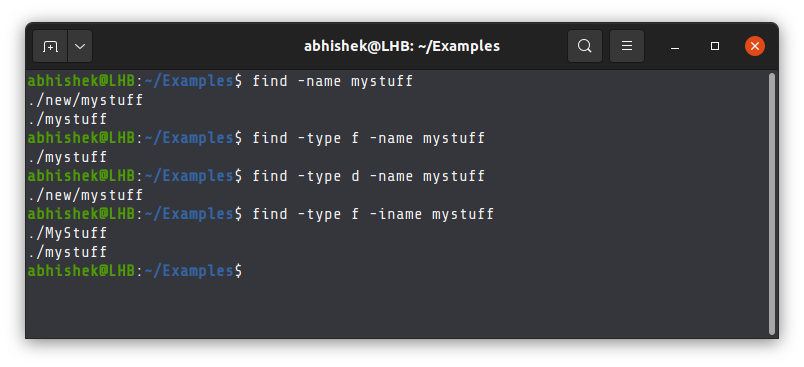
Поиск файлов по расширению (важно)
Одно из самых популярных применений команды find — поиск файлов определённого типа, то есть по заданному расширению.
Скажем, вы хотите найти все файлы С++ в текущих папках. Файлы С++ имеют расширение .cpp, и вот как их можно найти:
find . -type f -name "*.cpp"
С такими опциями команда find найдёт только файлы (-type f) с именами, оканчивающимися на .cpp.
abhishek@LHB:~$ find . -type f -name "*.cpp"
./file.cpp
./.cargo/registry/src/github.com-1ecc6299db9ec823/libz-sys-1.1.3/src/zlib/contrib/iostream2/zstream_test.cpp
./.cargo/registry/src/github.com-1ecc6299db9ec823/libz-sys-1.1.3/src/zlib/contrib/iostream/test.cpp
./.cargo/registry/src/github.com-1ecc6299db9ec823/libz-sys-1.1.3/src/zlib/contrib/iostream/zfstream.cppПри работе с командой find всегда заключайте поисковое выражение в двойные кавычки.
С чем связана рекомендация заключать поисковый запрос в двойные или одинарные кавычки? Дело в том, что без кавычек оболочка будет работать с символом * как с джокером и выполнит подстановку.
Вот что будет, если ввести запрос без кавычек:
find . -type f -name *.cppОболочка распознает подстановочный знак * и заменит его всеми файлами в текущей папке, чьи имена заканчиваются на .cpp.
Это сработает, если такой файл всего один, но если их несколько, оболочка пожалуется на некорректный синтаксис.
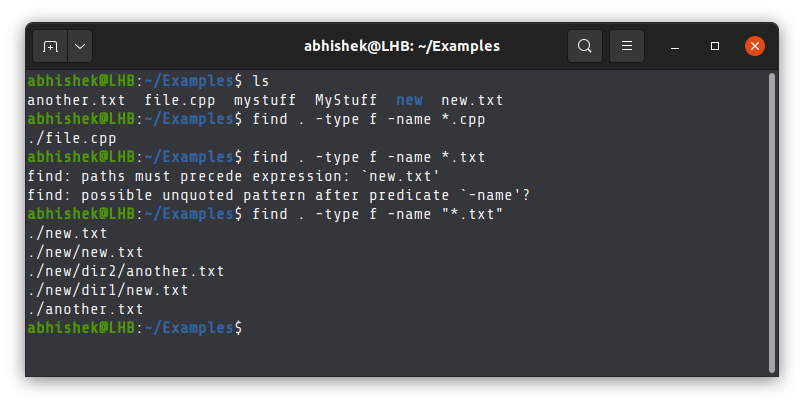
В нашем случае файл .cpp всего один, и после подстановки команда выглядит так: find . -type f -name file.cpp. Она работает, поскольку file.cpp — корректный поисковый запрос.
А вот файлов .txt в той же папке два, и когда команда расширяется до find . -type f -name another.txt new.txt, выводится предупреждение, потому что поисковых запросов больше одного.
Именно поэтому сам поисковый запрос всегда следует заключать в двойные кавычки.
Поиск нескольких файлов с несколькими расширениями (или условием)
Команда, рассмотренная выше, нужна для поиска файлов по расширению. А что если нужно найти файлы с несколькими разными расширениями?
Вместо того чтобы прогонять команду find несколько раз, введите её один раз с опцией -o, которая работает как логическое условие «или»:
find . -type f -name "*.cpp" -o -name "*.txt" Например:
abhishek@LHB:~/Examples$ find . -type f -name "*.txt" -o -name "*.cpp"
./new.txt
./file.cpp
./new/new.txt
./new/dir2/another.txt
./new/dir1/new.txt
./another.txtПоиск файлов в заданной папке
Все приведённые примеры иллюстрируют поиск в текущей папке, потому что команда включает в себя точку (.).
Чтобы выполнить поиск в заданной папке, не покидая текущего расположения, можно заменить точку абсолютным или относительным путём к нужной папке.
abhishek@LHB:~/Examples$ find ./new -name mystuff
./new/mystuffПоиск файлов в нескольких папках
Если нужные вам файлы могут находиться в нескольких папках, можно выполнить поиск во всех этих расположениях за один раз. Просто укажите все пути к папкам при введении команды find:
find ./location1 /second/location -type f -name "pattern"Поиск пустых файлов и папок
Опция -empty позволяет использовать команду find для поиска пустых файлов и папок.
Найти таковые в текущей папке можно следующим образом:
find . -emptyМожно указать тип объектов, чтобы искать только файлы или только папки:
find . -empty -type fКроме того, можно в таком режиме искать файлы по имени:
find . -empty -type f -name "*.cpp"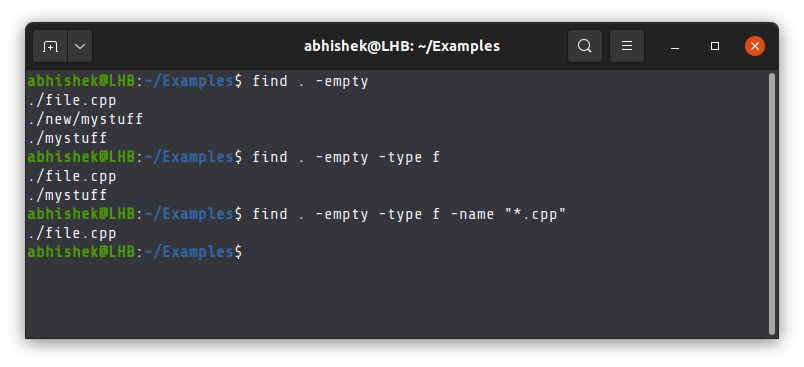
Поиск крупных и мелких файлов (поиск по размеру файла)
Команда find поможет найти крупные или мелкие файлы, если выполнить поиск по размеру. Но это работает только для файлов, не для папок.
Используется опция -size с аргументом +N для файлов размером более N и -N для файлов размером менее N.
А вот как можно найти файлы точного заданного размера (50 КБ):
find . -size 50kТак выполняется поиск файлов размером более 1 ГБ в текущей папке:
find . -size +1GА так — файлов, не превышающих 20 байт:
find . -size -20cДля поиска файлов размером более 100 МБ, но менее 2ГБ, введите:
find . -size +100M -size -2GПоиск по размеру тоже можно сочетать с поиском по имени файла. Таким образом, найти в корневом каталоге все файлы размером более 500 МБ с именем, оканчивающимся на .log, можно так:
find / -size +500M -name "*.log"Для справки:
-
c– байты -
k– килобайты -
M– мегабайты -
G– гигабайты
Поиск недавно изменённых файлов (поиск по времени изменения или создания)
Вы ведь знакомы с параметрами mtime, atime и ctime?
- Mtime – время последнего изменения файла
- Ctime – время создания файла
- Atime – время последнего доступа к файлу
Вы не раз столкнётесь с ситуацией, когда нужен список всех недавно изменённых файлов. В таких случаях на помощь приходит поиск по времени изменения.
Найти все файлы, претерпевшие изменения за последние трое суток (3*24ч), можно так:
find . -type f -mtime -3А все файлы, созданные пять и более дней назад, ищутся так:
find . -type f -ctime +5
Понимаю, что 24 часа — большой срок. Что если нужно выявить файлы, изменённые всего пару минут назад? Для этого предусмотрены опции mmin, amin и cmin.
Так выглядит команда поиска всех файлов, изменённых за последние пять минут:
find . -type f -mmin -5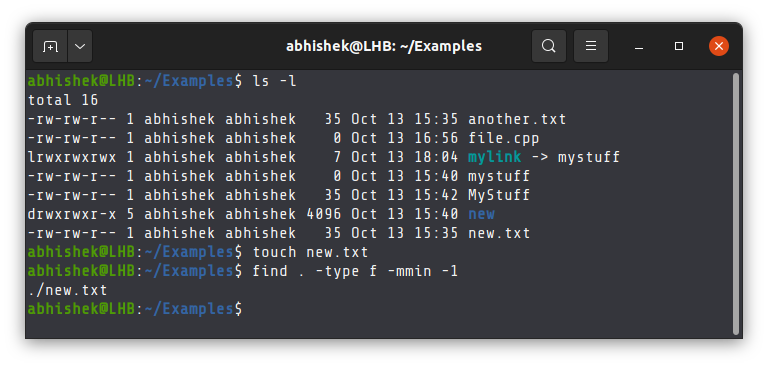
Можно не только указать имя файла, но и ограничить временной промежуток с двух сторон. Команда ниже выполнит поиск всех файлов .java, изменённых не ранее 30 и не позднее 20 минут назад.
find . -type f -mmin +20 -mmin -30 -name "*.java"Поиск файлов с определёнными настройками доступа
Надеюсь, вы имеете представление о разрешениях файлов в Linux.
Команда find позволяет выполнить поиск файлов по разрешению и режиму доступа.
find -perm modeПоищем в текущей папке, к примеру, все файлы с режимом доступа 777:
find . -perm 777А так можно найти все файлы с правами на чтение и запись для всех типов пользователей (только точное совпадение; файлы с правами на выполнение для всех не отобразятся):
find . -perm a=r+wПоиск файлов по владельцу
Можно также найти файлы, принадлежащие определённому пользователю.
Вот как обнаружить в текущей папке все файлы пользователя Джона:
find . -type f -user JohnЭта опция сочетается с другими, будь то размер или время и имя файла:
find . -type f -user John -name "*.cpp"Отключение рекурсивного поиска для поиска только в текущей папке
По умолчанию команда find выполняет поиск во всех подпапках текущего расположения. Если это не требуется, можно ограничить глубину поиска значением «1». Так вы ограничитесь поиском в текущей папке, не залезая в подпапки.
find . -maxdepth 1 -type f -name "*.txt"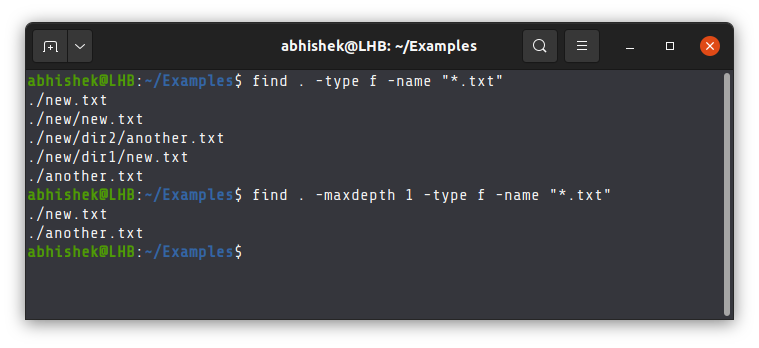
Исключение папки из поиска
Если нет необходимости производить поиск в той или иной папке, можно исключить её с помощью опций path, prune и логического «или».
find . -path "./directory_exclude/*" -prune -o -name SEARCH_NAME
Будьте внимательны: путь к папке должен оканчиваться на *, затем идёт -prune и только потом -o.
Попросту говоря, при поиске с опцией prune папка, указанная с помощью path, игнорируется. Prune всегда сопровождается флагом -o (логическое «или»), чтобы папки, которые не были исключены, просматривались на наличие искомого объекта.
Дальнейшая работа с результатами команды find: exec и xargs
Итак, мы изучили различные способы поиска файлов по заданным параметрам. Это хорошо. А теперь следующий шаг: рассмотрим, какие действия можно выполнять с результатами команды find.
Например, как найти файлы с именем, соответствующим определённому шаблону, и переименовать их за одно действие? Или выявить и удалить пустые файлы?
Вам уже известно, что в Linux можно использовать перенаправление ввода-вывода, чтобы объединить результаты одной команды с вводом другой. Но с результатами команды find это не сработает — по крайней мере, не напрямую.
Чтобы выполнить действия над результатом команды find, есть два варианта:
- Применить exec
- Применить xargs
Использование find и exec
Допустим, вам нужен подробный список (ls -l) файлов, найденных командой find. Вот как его получить:
find . -type f -name "*.txt" -exec ls -l {} +Результат будет таким:
abhishek@LHB:~/Examples$ find . -type f -name "*.txt" -exec ls -l {} +
-rw-rw-r-- 1 abhishek abhishek 39 Oct 13 19:30 ./another.txt
-rw-rw-r-- 1 abhishek abhishek 35 Oct 13 15:36 ./new/dir1/new.txt
-rw-rw-r-- 1 abhishek abhishek 35 Oct 13 15:36 ./new/dir2/another.txt
-rw-rw-r-- 1 abhishek abhishek 35 Oct 13 18:51 ./new/mystuff/new.txt
-rwxrwxrwx 1 abhishek abhishek 35 Oct 13 15:37 ./new/new.txt
-rw-rw-r-- 1 abhishek abhishek 35 Oct 13 18:16 ./new.txt
Многие забывают ввести {} + в конце команды exec. Но это необходимо — как и пробел между скобками {} и плюсом +.
Фигурные скобки ссылаются на результат выполнения команды find. Их содержимое может иметь следующий вид: {файл 1, файл 2, файл 3}. Символ + используется как конец команды exec.
Есть ещё один вариант оформления exec:
find . -type f -name "*.txt" -exec ls -l {} ;В данном случае плюс заменён на точку с запятой. Дополнительная косая черта означает, что точка с запятой не является специальным символом.
Преимущество сочетания {} + заключается в меньшем количестве команд ( ls -l file1 file2 file3), тогда как комбинация {} ; запустит цепочку ls -l file1, ls -l file2 и так далее.
Однако сочетание {} ; даёт возможность использовать {} несколько раз в одном и том же выражении exec. Так, приведённая ниже команда переименует все обнаруженные файлы с расширением .old.
find . -type f -name "*.txt" -exec mv {} {}.old ;Использование команды xargs
Многие пользователи Linux сталкиваются с необходимостью перенаправления ввода-вывода довольно часто. Но команда exec с цепочкой символов {} + кажется им слишком сложной.
И тут на помощь приходит xargs. Нужно просто перенаправить вывод команды find в команду xargs через конвейер.
find . -type f -name "*.txt" | xargs ls -l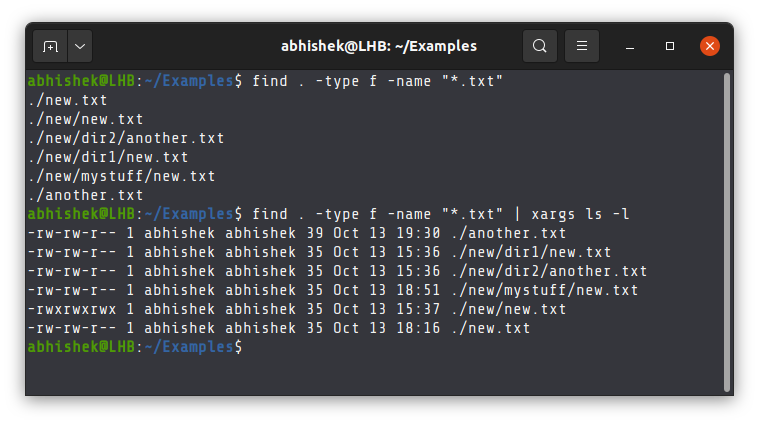
Синтаксис куда проще, верно? К тому же команда xargs тоже весьма эффективна. Подробнее о ней — в статье по ссылке.
Сочетание команд find и grep
Теперь вы умеете совмещать команду find с xargs и exec, и пора перейти на следующий уровень — объединить find и grep.
Для сисадминов и разработчиков комбинация команд find и grep — одна из самых распространённых и вместе с тем самых полезных.
Команда find находит файлы с именем, соответствующим шаблону, а затем команда grep выполняет поиск по их содержимому.
Например, вам нужно найти все файлы .txt, в которых есть имя «Alice». Объединить команды find и grep можно так:
find . -type f -name "*.txt" -exec grep -i alice {} +А можно с помощью xargs:
find . -type f -name "*.txt" | xargs grep -i alice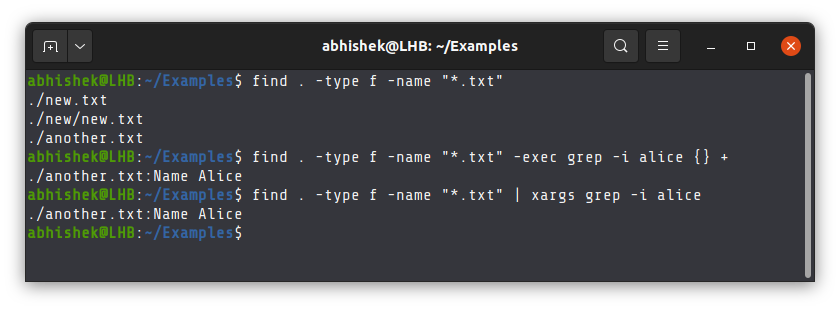
Конечно, пример элементарный, но если команда grep вам знакома, можете использовать её на своё усмотрение.
И это далеко не все возможности команды find…
Перечислить все опции и примеры использования команды find практически невозможно. Её возможностям нет границ, но если вы освоите её принципы, она окажется очень кстати во многих ситуациях. Решающий фактор — как сочетается логика действия разных опций и команд.
Надеюсь, моя подборка примеров использования find была для вас полезна. Если у вас есть вопросы или предложения, как сделать эту статью лучше, добро пожаловать в комментарии.
НЛО прилетело и оставило здесь промокоды для читателей нашего блога:
— 15% на все тарифы VDS (кроме тарифа Прогрев) — HABRFIRSTVDS.
— 20% на выделенные серверы AMD Ryzen и Intel Core — HABRFIRSTDEDIC.
Доступно до 31 декабря 2021 г.

